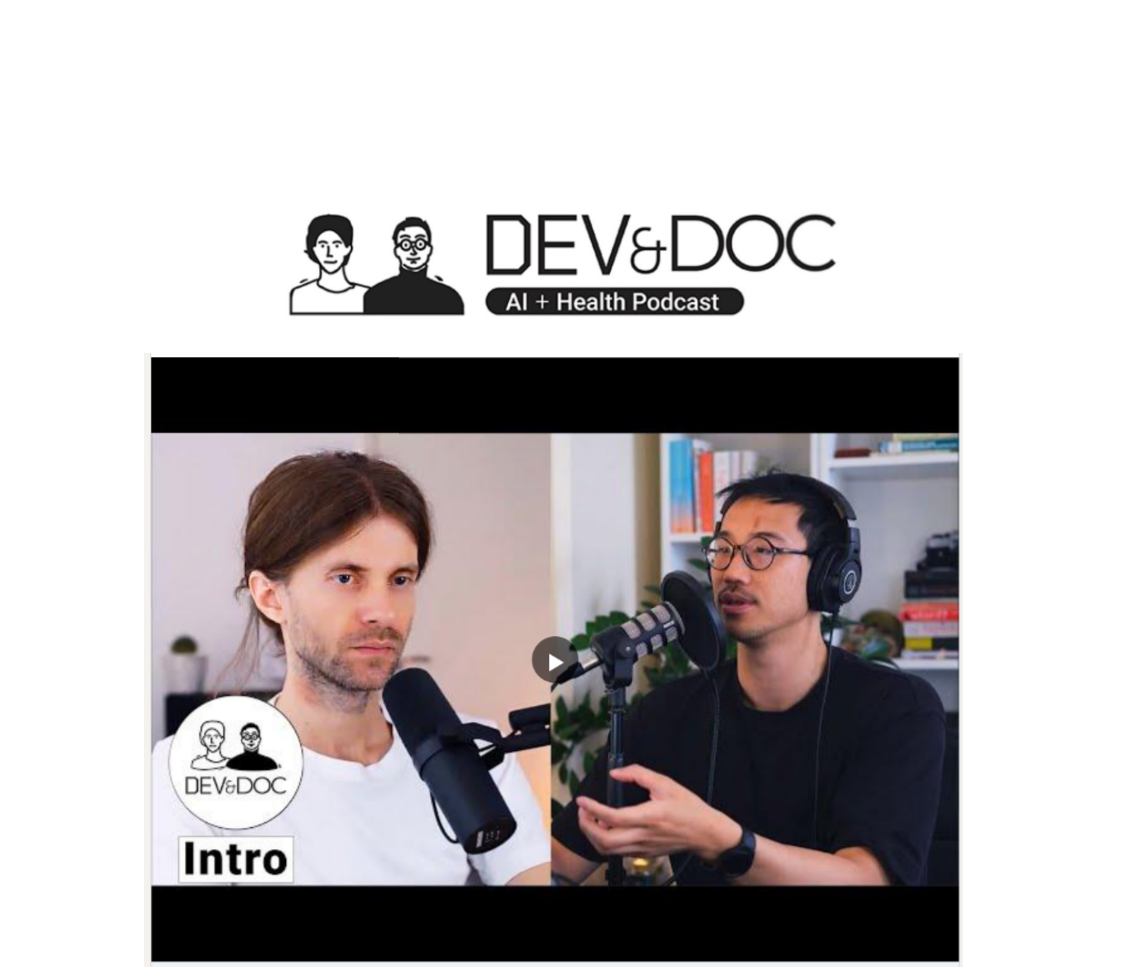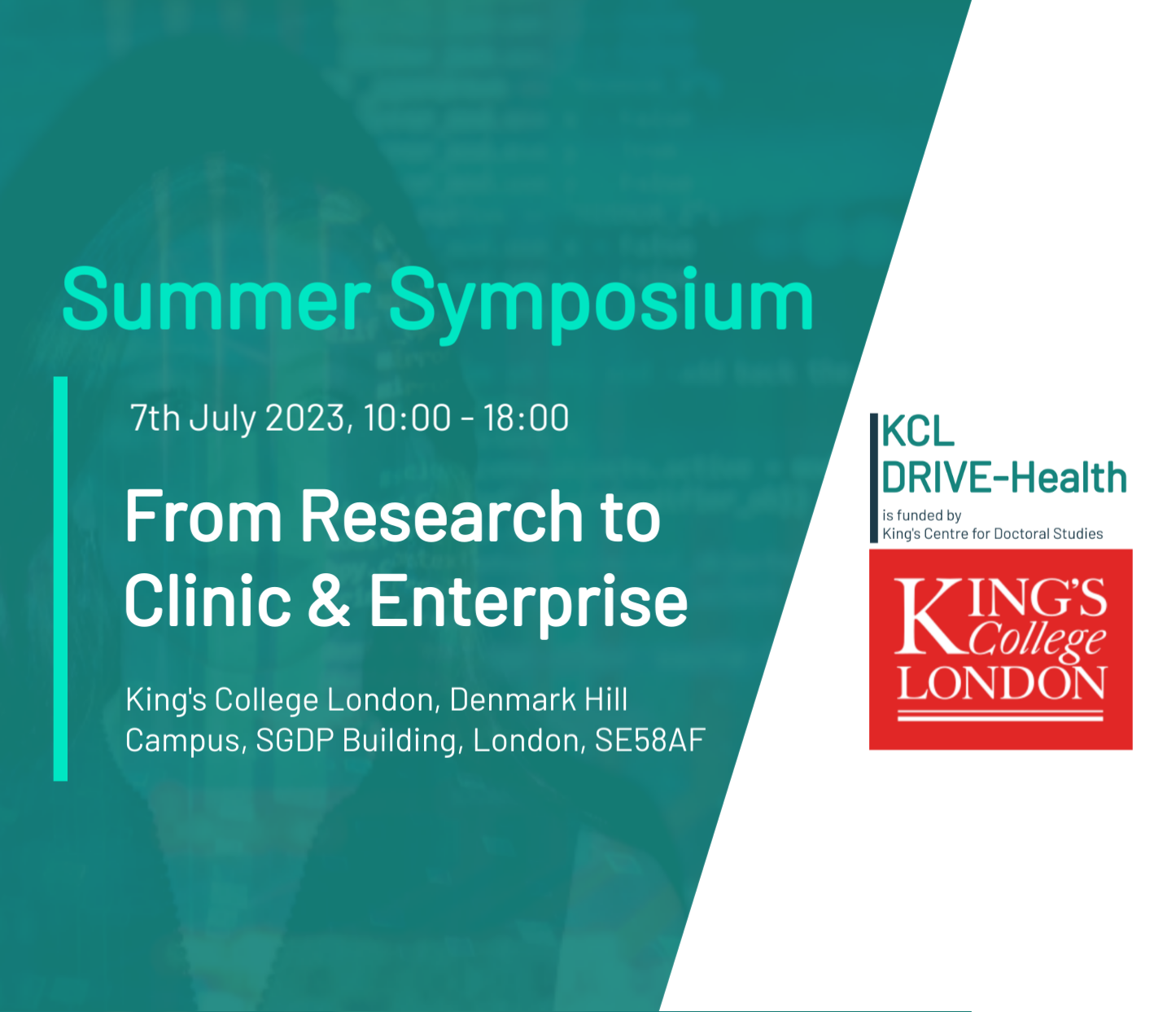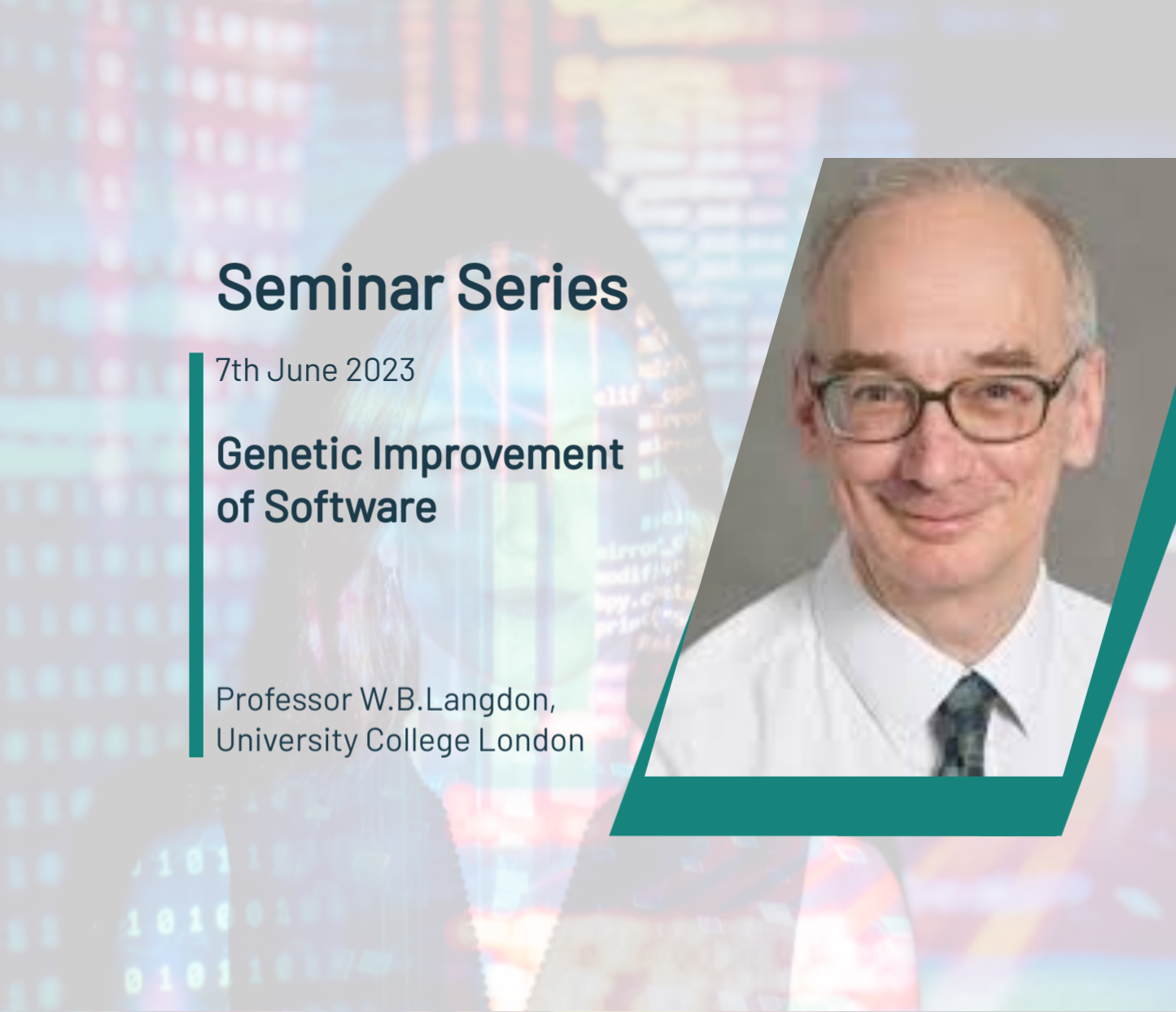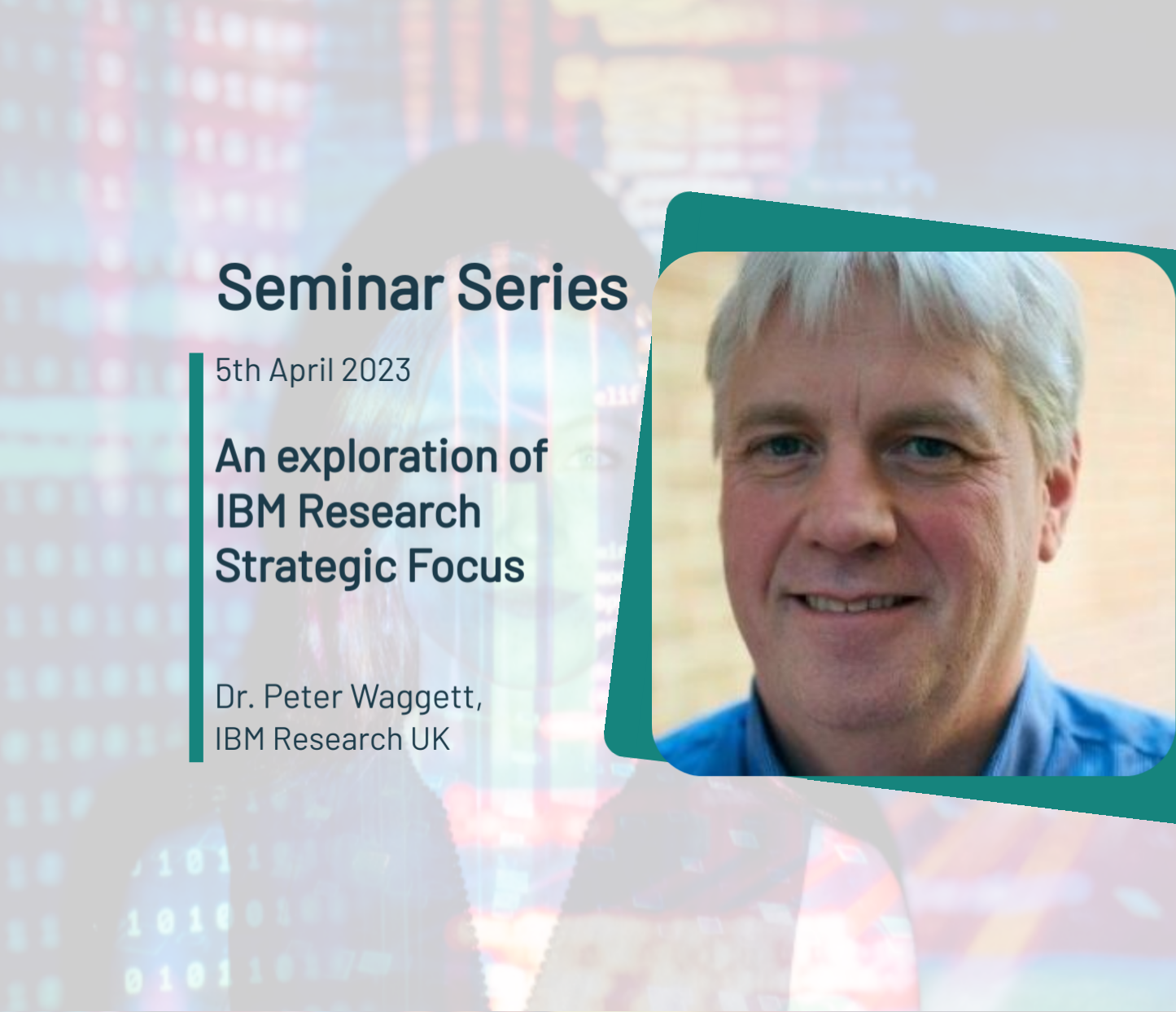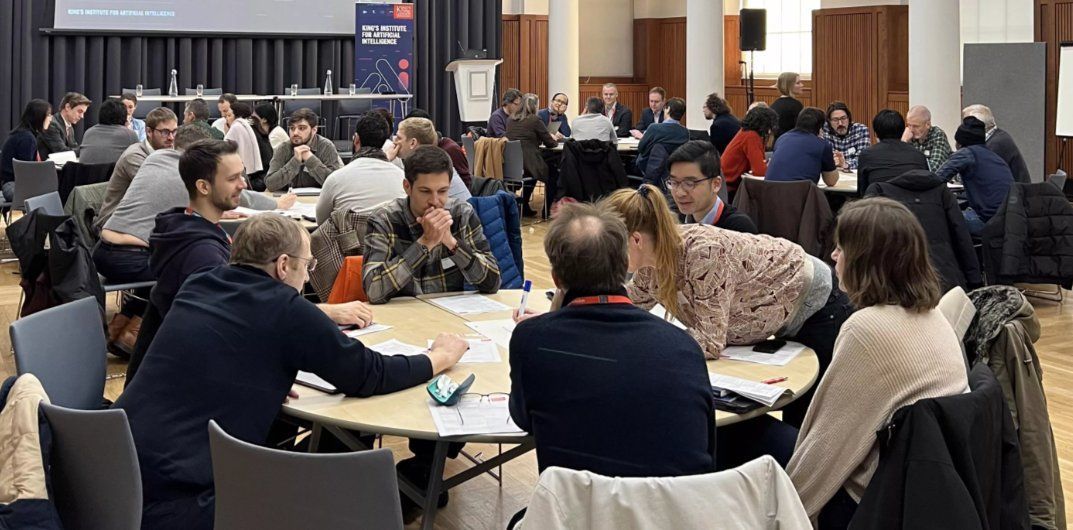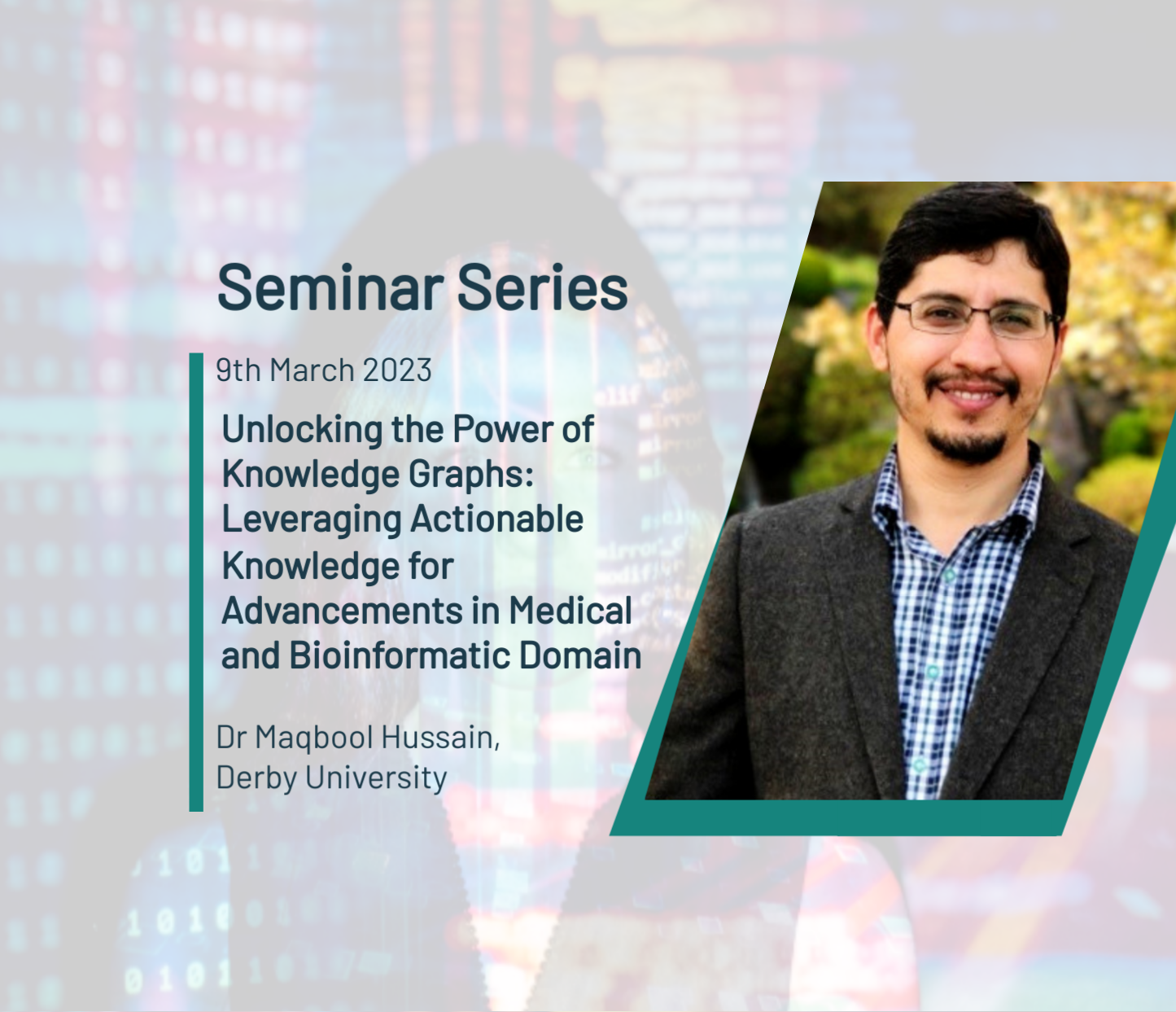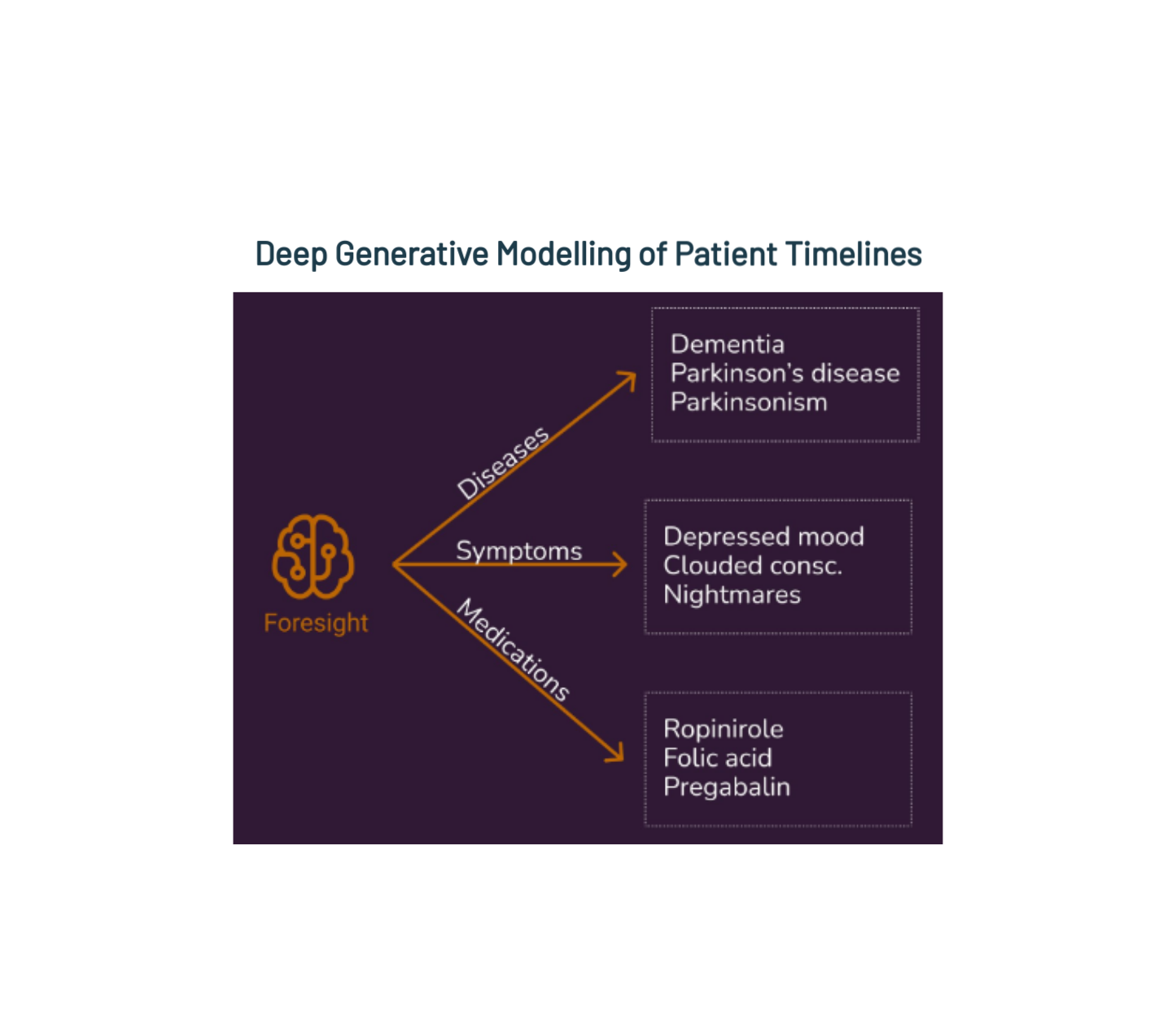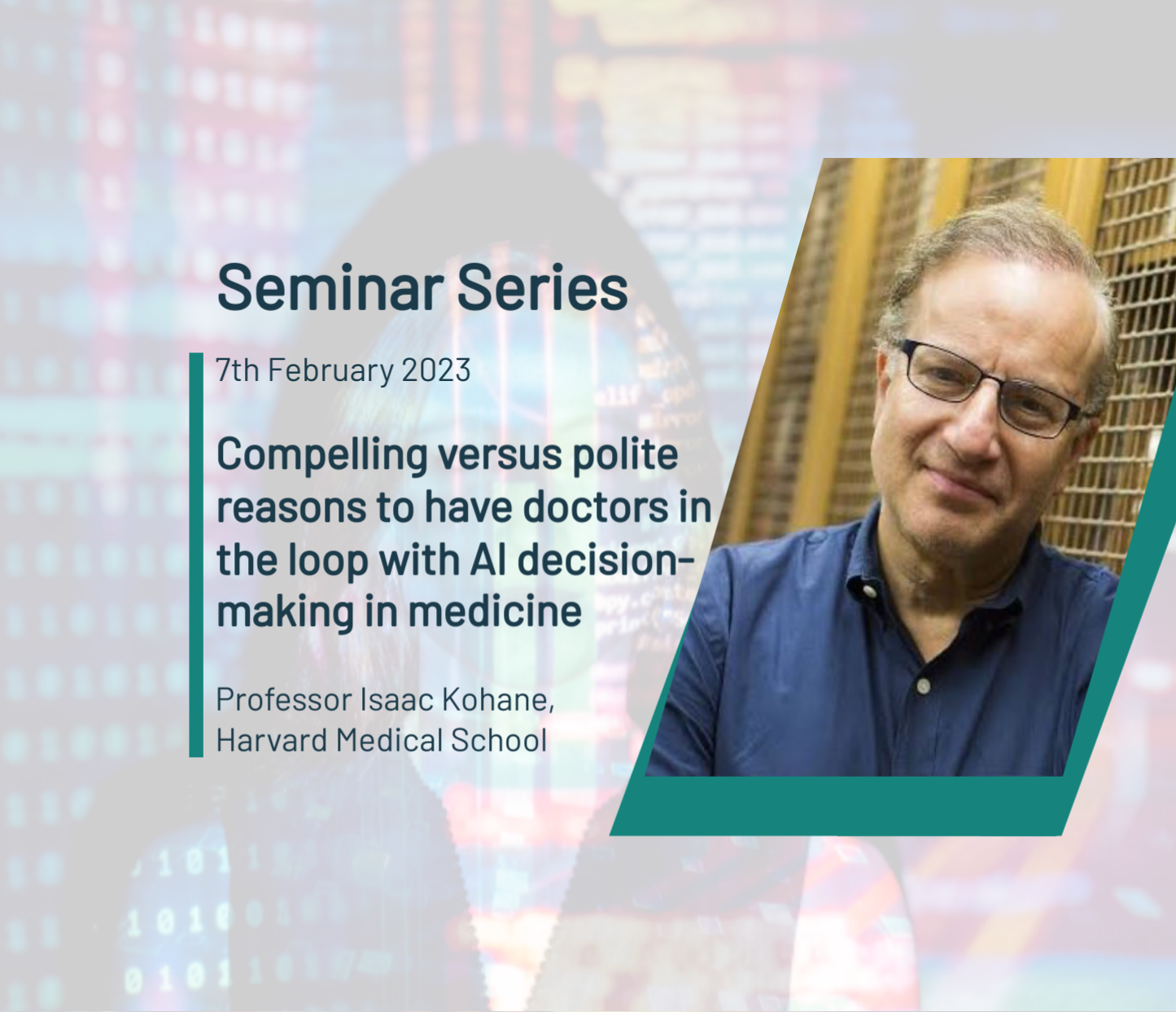connect with us
Register for occasional updates on our events and projects
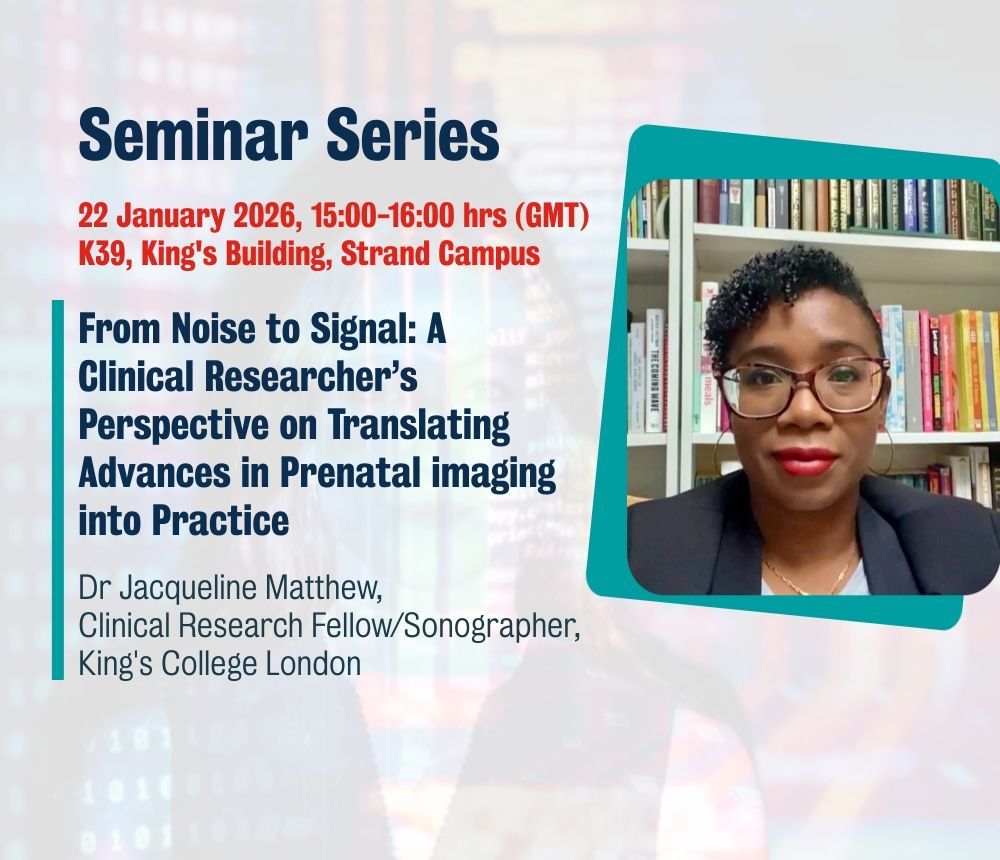
We are pleased to welcome Dr Jacqueline Matthew - Clinical Research Fellow/Sonographer at King's College London - who will deliver her talk “From Noise to Signal: A Clinical Researcher's Perspective on Translating Advances in Prenatal imaging into Practice" as part of our Seminar Series. Abstract: Over the past decade, machine learning approaches in prenatal imaging has advanced from exploratory academic prototypes to clinically usable, real-time tools, but the path between those two endpoints is rarely straightforward. In this talk, Jacqueline offers a clinical researcher’s perspective on translating biomedical engineering innovations into real-world impact, tracing the journey from the iFIND project’s early breakthroughs in automated fetal imaging to the creation of Fraiya, an AI-driven ultrasound platform now entering clinical deployment. She will unpack the technical, clinical, and regulatory hurdles that shape this trajectory: data acquisition at scale, annotation complexity, model robustness, pipeline optimisation for real-time use, clinical safety engineering, regulatory strategy, and integration with NHS digital ecosystems. Beyond the technical achievements, the session reflects honestly on the innovation “gaps” that researchers and engineers encounter when stepping into entrepreneurship. From productising research outputs, building 'with' clinicians and service users not just 'for' them, securing buy-in, navigating procurement, and proving value in operationally stretched healthcare services. The aim is to provide a pragmatic and motivating roadmap for researchers and innovators seeking to turn biomedical AI research into deployable, sustainable solutions in healthcare. Seminar Series Event : “From Noise to Signal: A Clinical Researcher's Perspective on Translating Advances in Prenatal imaging into Practice. Date and Time: Thursday 22 January 2026, 15:00 – 16.00 hrs (GMT) Location: K39, King's Building, Strand Campus Attendance: Mandatory for all DRIVE-Health students, therefore please accept the calendar invitation. Registration: Alumni and wider King's College London research community all welcome - please email drive-health-cdt@kcl.ac.uk to let us know if you would like to attend. Biography Jacqueline is a clinical academic, sonographer, and MedTech entrepreneur with over 20 years of experience in advancing pregnancy care through compassionate, technology-driven solutions. Specialising in ultrasound and fetal MRI, Jacqueline’s work focuses on leveraging cutting-edge imaging technologies to improve screening, diagnosis, and care for pregnant women. With a PhD in advanced 3D ultrasound and fetal MRI, Jacqueline uses machine learning to refine diagnostic pathways, pushing the boundaries of what’s possible in prenatal care. As Clinical Lead and Chief Medical Officer at an early-stage health tech startup, she has been at the forefront of developing a real-time AI-powered pregnancy ultrasound platform, with ambitions to transform how scans are performed, enhancing diagnostic accuracy, and empowering healthcare professionals to deliver more informed and compassionate care. Jacqueline’s work has earned her widespread recognition, including being named one of the inaugural winners of the NHS England CAHPO Gold Award for Excellence, which celebrates health professionals who exemplify exceptional contributions to healthcare and the NHS values.
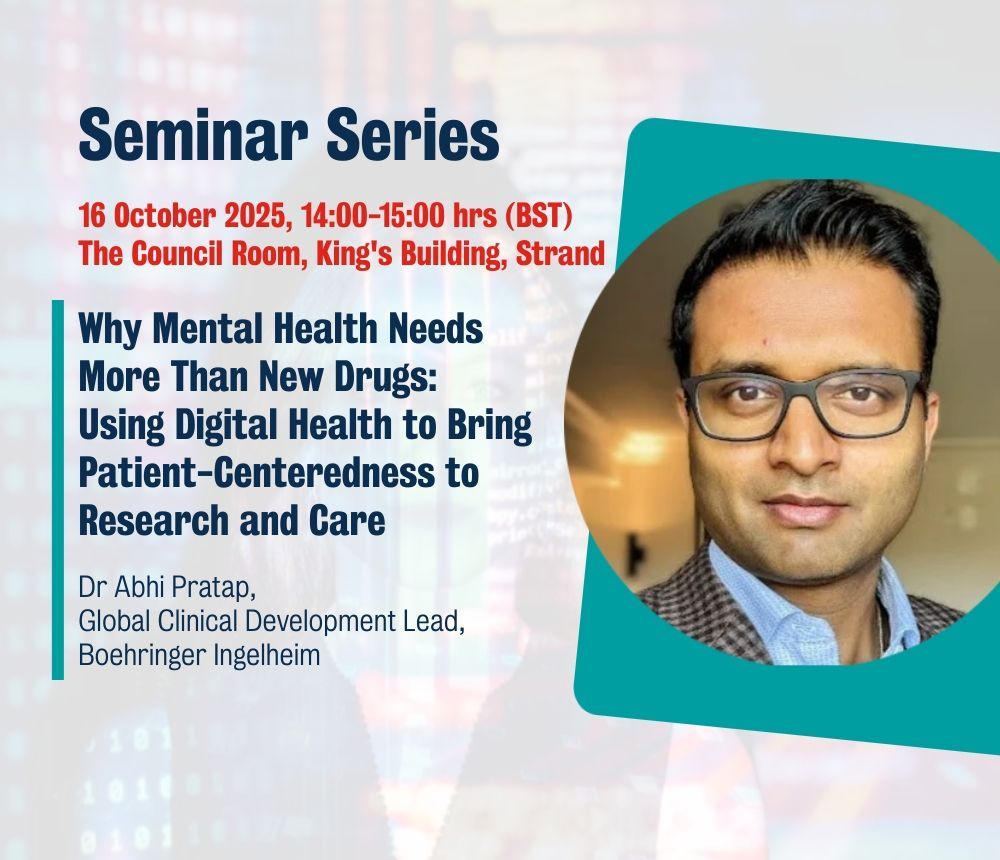
We were thrilled to welcome Dr Abhi Pratap - Global Clinical Development Lead at Boehringer Ingelheim who delivered our October Seminar Series. In his talk “Why Mental Health Needs More Than New Drugs: Using Digital Health to Bring Patient-Centredness to Research and Care" , Abhi shared case examples from emerging clinical studies to show how digital health can bridge the gap between clinical research and patient care in mental health. We will explore digital health solutions that help quantify the real-world experiences of health that matter to people - bringing us closer to understanding what treatments work for whom, why, when, and for how long. Abstract: Innovation in mental health treatment has been strikingly limited compared to other fields of medicine. In the last 15 years, fewer than five truly novel psychiatric drugs have received regulatory approval. This stagnation reflects multifaceted challenges linked to heterogeneity of psychiatric disorders often lacking biological markers grounded in disease biology. Additionally, there is significant reliance on subjective clinician-, rater-, or patient-reported outcomes, which increases variability in trial outcomes and poses challenges in patient selection and endpoint determination. Clinical studies also encounter persistent obstacles, such as high dropout rates, poor generalizability, and endpoints that frequently do not reflect what patients and their families value most. Consequently, there is a critical gap in new treatment development that are patient-centered, enhancing quality of life in real-world settings. Use-case-centered implementation of digital health technologies offers a realistic path to address many of these barriers. Real-world data collected from smart devices can enable the continuous and ecologically valid capture of mood, cognition, behavior, and functioning, augmenting traditional, episodic assessments. This richer measurement framework can enhance sensitivity to change, reduce trial inefficiencies, and ground outcomes more directly in patients lived experience. In addition, the same smart devices can be used to deliver digital adaptations of psychosocial interventions, expanding access to evidence-based care and offering personalized and scalable options for populations that have been historically underserved due to stigma, geography, or cost. Dr. Abhi Pratap is the Global Clinical Development Lead at Boehringer Ingelheim, where he oversees clinical development programs for digital therapeutics aimed at addressing unmet needs in serious mental illnesses. Before joining Boehringer, he worked at Biogen, managing one of the largest decentralised studies on cognitive trajectories in real-world settings in collaboration with Apple. With over 15 years of experience in translational biomedical research, Dr. Pratap has led numerous health research studies that promote partnerships between academia and industry. His primary focus is on using digital health technologies to gain a deeper understanding of the real-life experiences of individuals with neurological and psychiatric disorders. His cross-sector research aims to accelerate patient-centered clinical development in central nervous system (CNS) disorders. Most recently, he led a successful pivotal Phase III trial targeting experiential negative symptoms of schizophrenia (NCT05838625) using a digital therapeutic. This study is among the first confirmatory trials to show improvement in negative symptoms to date. Additionally, Dr. Pratap serves as an adjunct faculty member at the University of Washington in Seattle and Boston University, and he is a visiting research fellow at King’s College London.
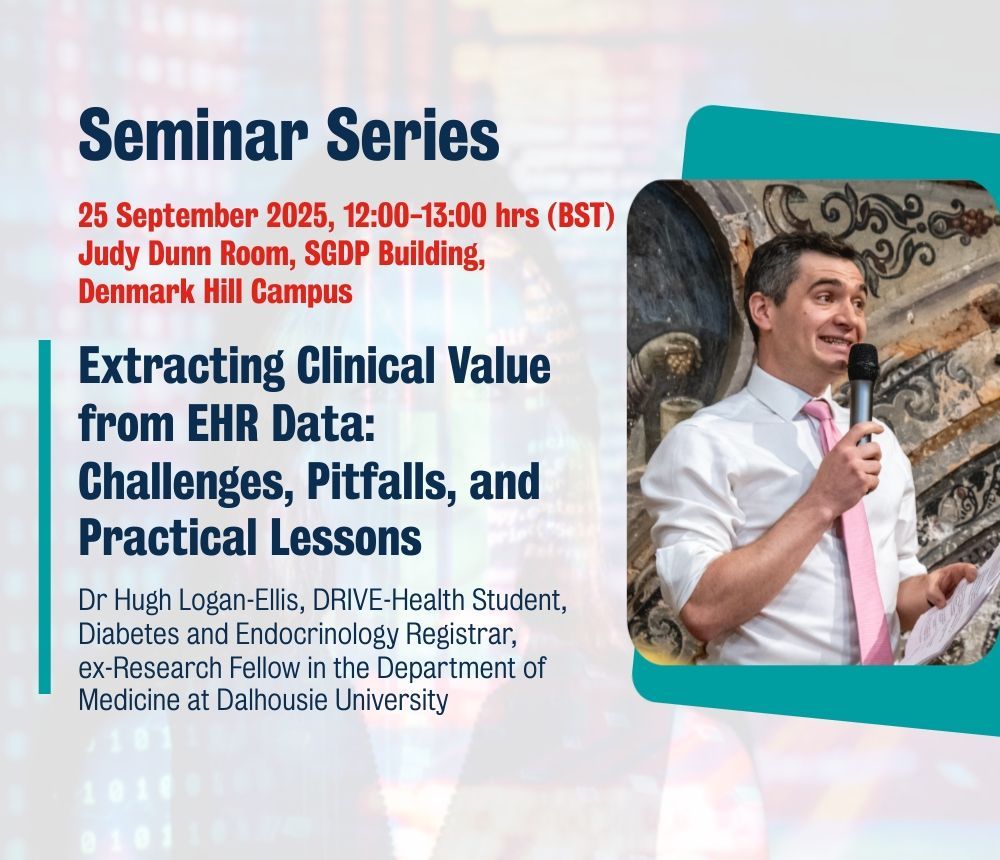
It was great to welcome back DRIVE-Health PhD student, Dr Hugh Logan-Ellis - a Diabetes and Endocrinology Registrar at King's and ex-Research Fellow in the Department of Medicine at Dalhousie University - who delivered our September Seminar Series. In his talk “Extracting Clinical Value from EHR Data: Challenges, Pitfalls, and Practical Lessons" , Hugh shared what clinicians have taught him about the reality of working with Electronic Health Record data and what they genuinely need from #AI tools, rather than what researchers might think they should want. Hugh has learned that making the most clinically useful tool could matter more than theoretical perfection. He'll discuss some principles he's gathered to help create AI solutions that fit seamlessly into clinical workflows, which he hopes might help others bridge the gap between academic research and genuine patient benefit. Using his PhD research on creating a single unit of health from #EHR data as a central example, Hugh will explore broader challenges: the messiness of real-world clinical data, the proliferation of unused risk scores, and why so many promising algorithms never make it past publication. These insights aim to help researchers develop tools that won't just die in papers, but have a real chance of improving clinical care. Seminar Series Event: " Extracting Clinical Value from EHR Data: Challenges, Pitfalls, and Practical Lessons" Date and Time: Thursday 25 September 2025, 12:00 – 13.00 hrs (BST) Location: The Judy Dunn Room, SGDP Building, Denmark Hill Campus, London, SE5 8AF Attendance: Mandatory for all DRIVE-Health students, therefore please accept the calendar invitation. Registration: Alumni and wider King's College London research community all welcome - please email drive-health-cdt@kcl.ac.uk to let us know if you would like to attend. Abstract: Picture the scene: It's Saturday morning, you're the senior resident doctor on call in a busy hospital, and you have a 40-page list of patients due for review. Half of your junior colleagues have called in sick, and you know you can't possibly see everyone. How do you decide who needs to be seen most urgently? The information to make these decisions is in the electronic health records, but accessing it quickly means opening each patient's chart individually. My PhD tries to tackle this problem: could we use an algorithm to compress scattered clinical data into a single, practical number? This question has led me on an interesting journey. I've spoken with clinicians from around the world about how they decide who is "sickest," discovering a surprising variety of terms for essentially the same idea and realising we might need more than one measure. My research has taken me to Canada to collaborate with Professor Kenneth Rockwood OC, whose groundbreaking work on frailty measurement has significantly shaped clinical practice worldwide. Working alongside him has given me valuable insights into why some academic ideas successfully transform patient care, while others remain confined to journals. As I explored increasingly sophisticated approaches to measure sickness, from simple laboratory-based indices to complex machine learning models, I stumbled across a key insight. Supervised machine learning can hindered by retrospective health data because when sick patients are successfully treated, they don’t have poor outcomes. This isn't just a quirky finding relevant to my PhD; it has broader implications for using a supervised paradigm on retrospective data whenever effective treatments are already in place. Bio Hugh is a resident medical doctor specialising in Internal Medicine and Diabetes and Endocrinology, working on his PhD at King's College London. His research focuses on measuring patient health status using electronic health records, drawing on his experience working across various healthcare settings in the UK and internationally.
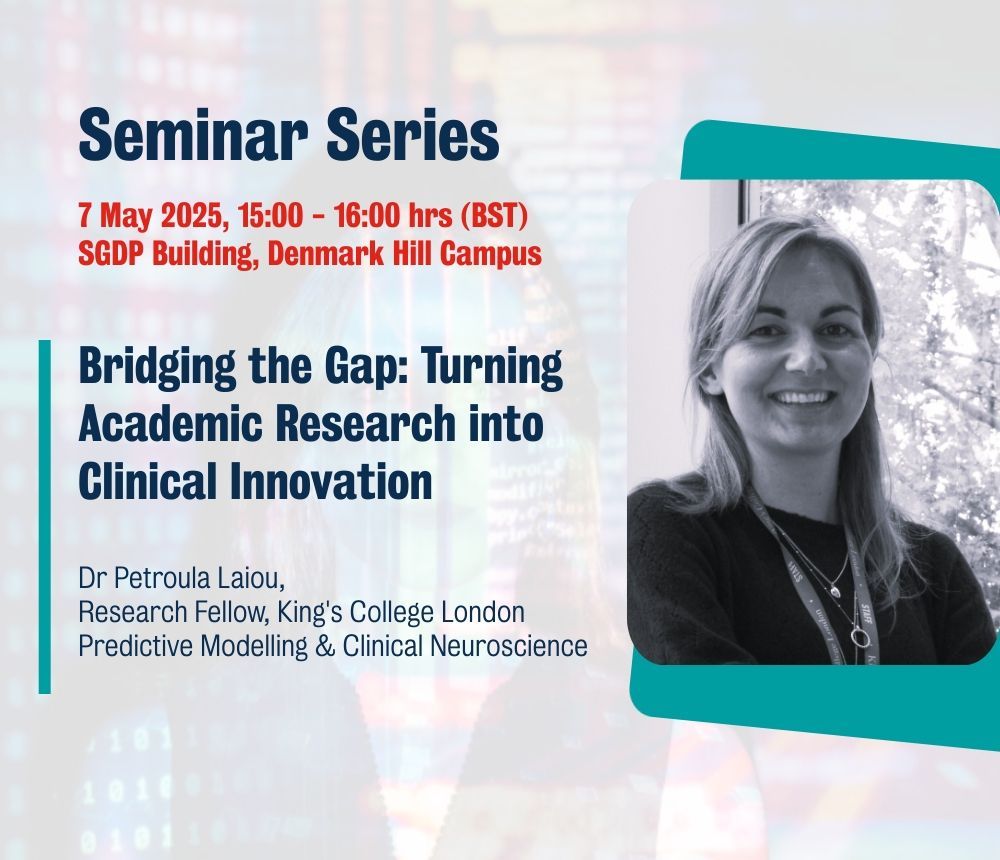
Thanks to Dr Petroula Laiou from King's College London , for delivering our May Seminar Series with her talk, "Bridging the Gap: Turning Academic Research into Clinical Innovation " . Petroula shared her journey of translating cutting-edge academic research into a mission-driven MedTech company. The spinout is pioneering a novel approach to forecasting and preventing seizures in people with drug-resistant epilepsy - an innovation rooted in years of interdisciplinary work at the intersection of clinical neuroscience, signal processing, and artificial intelligence. Dr. Laiou took the audience through the full translational pathway: from identifying an unmet clinical need, designing and analysing first-in-human studies, and developing a seizure prediction algorithm, to securing translational funding, navigating the intellectual property landscape, and filing an international patent (PCT/GB2024/052456). She reflected on key lessons learned during her time in the King’s MedTech Accelerator Programme - where the team won the Best Innovation award - and share insights on building bridges between academia and industry, shaping a commercialization strategy, and transitioning from researcher to entrepreneur. The talk also highlighted the challenges and rewards of launching a spinout in the healthcare sector and offer practical advice for PhD students and early-career researchers considering the entrepreneurial route. Seminar Series Event: "Bridging the Gap: Turning Academic Research into Clinical Innovation" Date and Time: Wednesday 7 May 2025, 15:00 – 16.00 hrs (BST) Location: The Lorna Wing Room, SGDP Building, Denmark Hill Campus, London, SE5 8AF Attendance: Mandatory for all DRIVE-Health students, therefore please accept the calendar invitation. Registration: Alumni and wider King's College London research community all welcome - please email drive-health-cdt@kcl.ac.uk to let us know if you would like to attend. Dr. Petroula Laiou is a Research Fellow in Predictive Modelling and Clinical Neuroscience at King’s College London. With a background in mathematics, computational physics, and a PhD in signal analysis, her research bridges computer science, neuroscience, and machine learning. Her work focuses on developing predictive models and digital biomarkers for neurological and psychiatric disorders, including epilepsy and depression. Dr. Laiou led the development of a novel seizure forecasting algorithm using intracranial EEG and cortical responses to electrical stimulation—research that led to the filing of an international patent (PCT/GB2024/052456). She is the recipient of multiple research grants, including an MRC award as Principal Investigator, and her translational work was recognised by the King’s MedTech Accelerator Programme, where her team won the Best Innovation award. She has authored over 40 peer-reviewed publications, presented at major international conferences, and actively contributes to interdisciplinary collaborations across academia, hospitals, and industry.
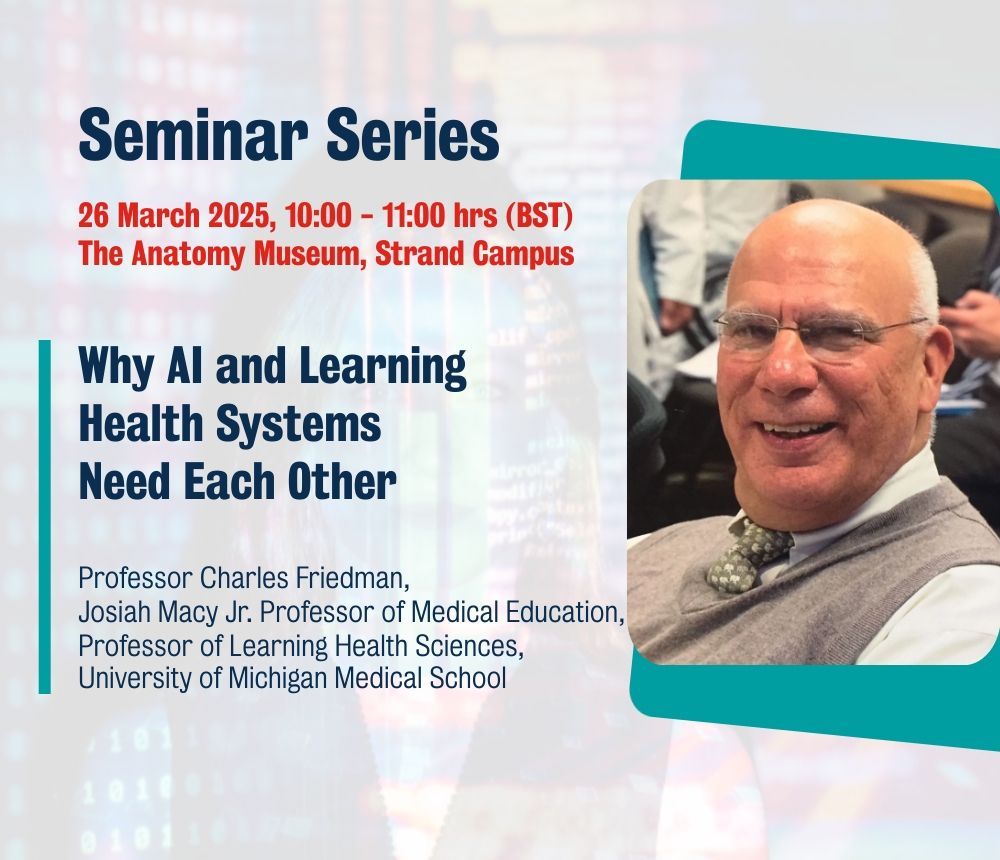
We were thrilled to welcome Charles Friedman from the University of Michigan Medical School , who delivered our March Seminar Series with his talk, "Why AI and Learning Health Systems Need Each Other " . Charles began by advancing the idea that, while both are extremely important: AI is a means and Learning Health Systems (LHS) are an end--and why it is most important to maintain that distinction. He introduced the socio-technical infrastructure required for high-functioning learning systems and argue that this infrastructure provides a framework, actually a schematic, for successfully implementing AI into healthcare. Charles Friedman is Professor of Learning Health Sciences at the University of Michigan Medical School, where he directs the Knowledge Systems Laboratory. He was formerly Founding Chair of the Department of Learning Health Sciences and the Josiah Macy Jr. Professor of Medical Education. He holds joint appointments in the Schools of information and Public Health. He is editor-in-chief of the open-access journal Learning Health Systems and co-chair of the multi-national movement to Mobilize Computable Biomedical Knowledge. Throughout his career, Friedman has developed and studied methods to improve health, education, and research through innovative applications of information technology. Most recently, Friedman has focused his academic interests and activities on the concept of Learning Health Systems that improve health by marrying discovery to implementation, and the socio-technical infrastructure required to sustain these systems. Friedman is a Distinguished Fellow of the American College of Medical Informatics, and a founding fellow of the International Academy of Health Sciences Informatics. He holds an honorary doctorate from the University of Lucerne in Switzerland for his contributions to the science of Learning Health Systems. Prior to coming to Michigan, Friedman held executive positions at the Office of the National Coordinator for Health IT (ONC) in the U.S. Department of Health and Human Services. Immediately prior to his work in the government, he was Associate Vice Chancellor for Biomedical Informatics, and Founding Director of the Center for Biomedical Informatics at the University of Pittsburgh. Seminar Series Event: "Why AI and Learning Health Systems Need Each Other" Date and Time: Wednesday 26 March 2025, 10:00 – 11.00 hrs (BST) Location: The Anatomy Museum, King's Building, Room K6.36, Strand Campus, Strand, London, WC2R 2LS Attendance: Mandatory for all DRIVE-Health students, therefore please accept the calendar invitation. Registration: Alumni and wider King's College London research community all welcome - please email drive-health-cdt@kcl.ac.uk to let us know if you would like to attend.
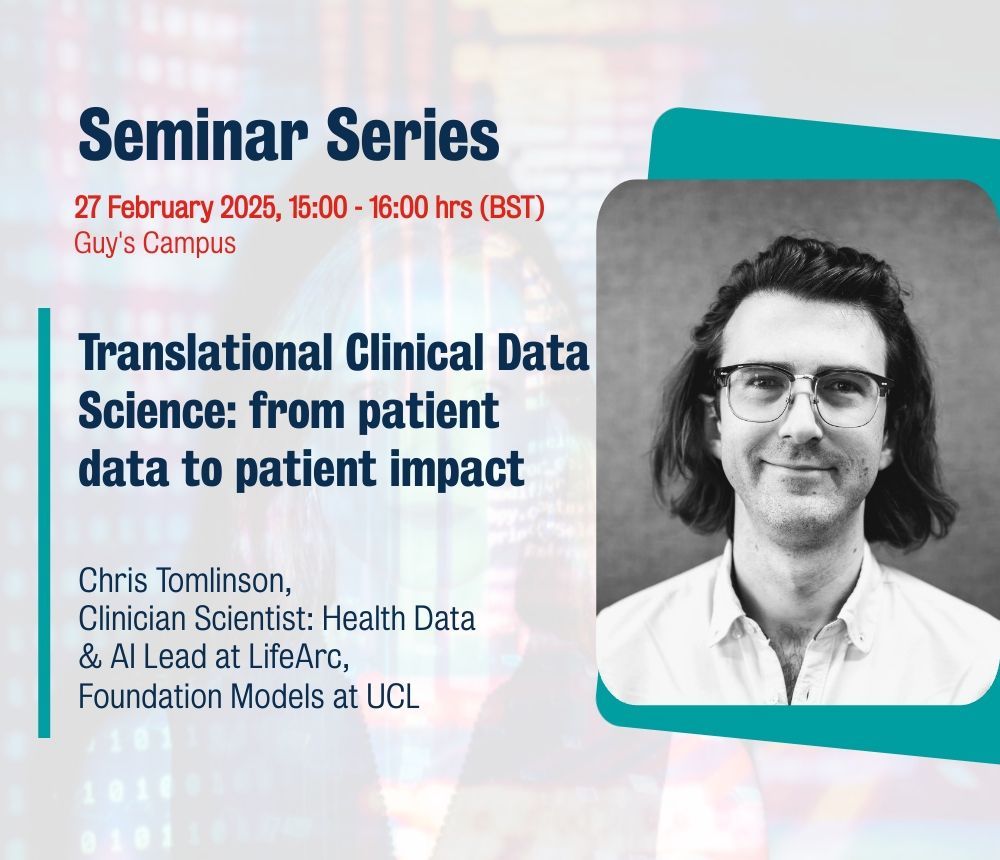
It was a pleasure to welcome C hris Tomlinson from LifeArc , who delivered our February Seminar Series with his talk, "Translational Clinical Data Science: from patient data to patient impact " . Chris gave an overview of LifeArc, a self-funded translational research charity, seeking to deliver patient benefit and address unmet needs. As UK Health Data & AI lead, he focuses on how they harness data science and AI to fulfil their aim: to ‘make life sciences, life changing’. Chris is a clinician by background, specialising in Anaesthesia & Intensive Care, before transitioning to full-time research. His work leverages electronic health records, epidemiology and artificial intelligence at scale to advance our understanding of health and disease, and address the fundamental challenges of precision medicine. His research has been featured in top medical journals and informed both policy and clinical practice internationally. Seminar Series Event: "Translational Clinical Data Science: from patient data to patient impact" Date and Time: Thursday 27 February 2025, 15:00 – 16.00 hrs (BST) Location: Hodgkin Building, Classroom 6, Guy's Campus Attendance: Mandatory for all DRIVE-Health students Registration: Students, alumni and wider King's College London research community, please email drive-health-cdt@kcl.ac.uk to register.
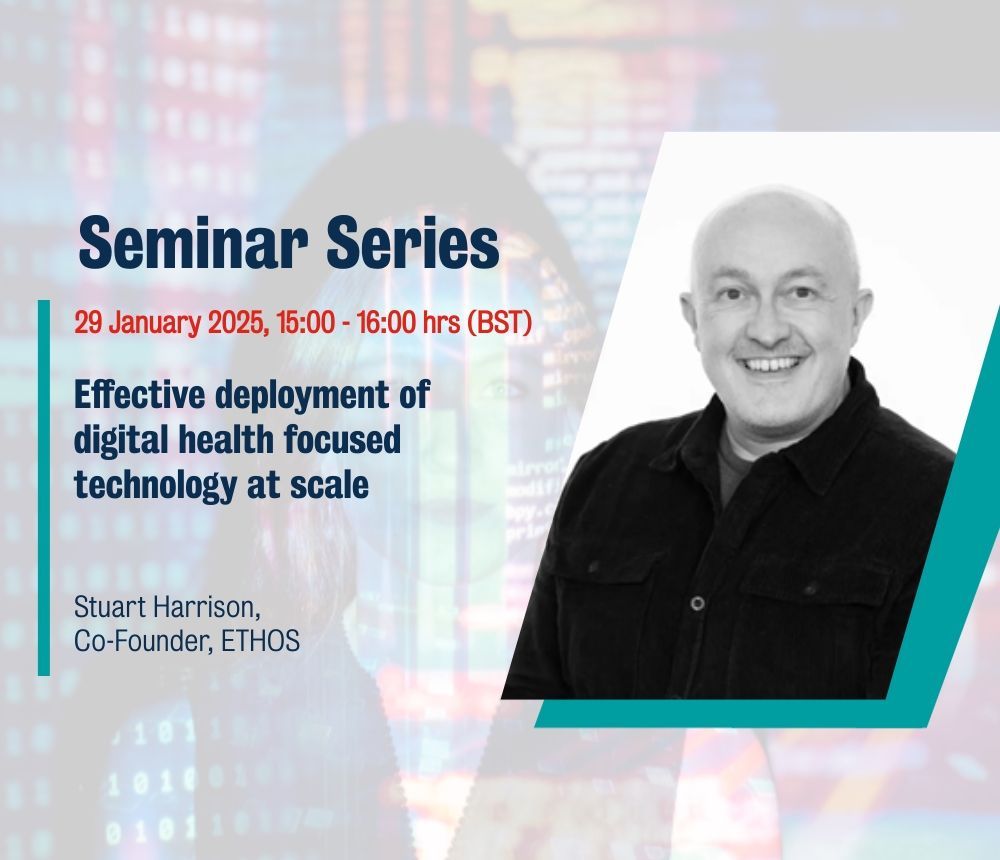
It was a pleasure to welcome Stuart Harrison from ETHOS , who delivered our first 2025 Seminar Series with his talk, "Effective deployment of digital health focused technology at scale " . Stuart has led the Clinical Safety movement in the NHS alongside some of the most prominent Clinical leaders for over 20 years. Stuart is now the co-founder & director of ETHOS, a company providing ethical services to the health industry. Seminar Series Event: "Effective deployment of digital health focused technology at scale" Date and Time: 15:00 – 16.00, Wednesday 29 January 2025 Location: The Judy Dunn Room, Social Genetic and Developmental Psychiatry Building, Denmark Hill Campus, Memory Lane, London SE5 8AF Registration: EPSRC DRIVE-Health students, alumni and wider King's College London research community. Please email drive-health-cdt@kcl.ac.uk to register interest. Abstract: ETHOS will provide insight into the requirements for the safe, secure, and effective deployment of digital health focused technology at scale. Discussions concerning early research problem identification, health system challenges and taking research through to minimum viable product (MVP) and minimum marketable product (MMP). The objective is to highlight the benefit of earlier alignment with regulatory challenges to aid successful interventions and to demonstrate standards can be an enabler not a barrier to innovation. Stuart Harrison has led the Clinical Safety movement in the NHS alongside some of the most prominent Clinical leaders for over 20 years. Stuart is now the co-founder & director of a company providing ethical services to the health industry. ETHOS Ltd was formed in 2014 as a result of a feasibility study completed in partnership with a large pharmaceutical company in the interests of furthering medical science / MedTech innovation. ETHOS was formed from subject matter experts in the compliance requirements for the NHS covering security, information governance, clinical safety, Medical Devices and General Data Protection Regulations. Stuart’s background is Engineering, particularly safety critical industries where safety has immediate risk to harm to system users or the wider general population. He was one of the original authors of the clinical safety standards. An expert advisor (BSI UK) international safety, security, and effectiveness standards; leading this area since 2017 and creating a legacy from the widely recognised NHS clinical safety practises into the international health informatics industry. Stuart has significantly contributed to over 1000 health software systems being clinically assured and provided subject matter input to over 3000 service incidents with patient safety impact in the NHS. He led the creation of clinical risk management toolkits to enable self-certification across the industry for low-risk unregulated health software & ensuring they are compatible with new medical device regulations. A specialist advisor to NICE for medical technology and work closely with MHRA and other arm’s length bodies where patient safety and health software initiatives are needed. A steering group member and advisor to many professional institutions and organisations representing digital health; Stuart is helping to influence safety culture and methods across a number of domains. Stuart was co-author of the government’s Regulators Pioneer Fund bid to address the assurance of AI & machine learning in health software. Having successfully facilitated a £1M research grant being awarded to NHS Digital & MHRA. Digital Leader finalist – Digital City Awards 2021. Stuart is currently studying part time for a PhD at the University of Warwick on the subject of clinical decision supporting systems including safety concepts for emerging technology & complementary regulatory frameworks, the inclusion of mobile health data into safer decision making and exploring the lifecycle models of clinical decision supporting systems.

We were thrilled to welcome Nobel Prize winner, Dr John Jumper , who kicked-off our 2024/2025 Seminar Series with his talk, "Extending AlphaFold to make predictions across the universe of biomolecular interactions" . John is one of the key pioneers behind the development of Google’s DeepMind AlphaFold - an artificial intelligence model to predict protein structures from their amino acid sequence with high accuracy. This in-person event was an incredible opportunity to hear from one of the foremost innovators in AI and biology. Seminar Series Event: Extending AlphaFold to make predictions across the universe of biomolecular interactions Date and Time: 14:00 – 15.00, Thursday 10 October 2024 Location: The Council Room, 2nd floor, The King’s Building, Strand Campus Registration: Limited to EPSRC DRIVE-Health students in the first instance. Please email drive-health-cdt@kcl.ac.uk to check availability. Abstract: The high accuracy of AlphaFold 2 in predicting protein structures and protein-protein interactions raises the question of how to extend the success of AlphaFold to general biomolecular modeling, including protein-nucleic and protein-small molecule structure predictions as well as the effects of post-translational modification. In this talk, I will discuss our latest work on AlphaFold 3 to develop a single deep learning system that makes accurate predictions across these interaction types, as well as examine some of the remaining challenges in predicting the universe of biologically-relevant protein interactions.

We are thrilled to invite John Vardakis to speak at our EPSRC DRIVE-Health CDT's summer symposium next month. John joins us from Science Card to talk about " Exploring the Frontier: The future of GenAI Investments and Collaborations in Industry and Academia ." John Vardakis, PhD , has a diverse work experience, primarily in the field of scientific research. John is currently serving as the Head of Science Card Investment Group at Science Card, where they are involved in innovative banking. Previously, they worked as a Research Scientist at the University of Glasgow, where they focused on simulation-driven microelectromechanical systems design. John also worked as a Research Scientist at INSERM, investigating tumor mechanics and vascular fractality quantification. At the Center for Computational Imaging & Simulation Technologies in Biomedicine (CISTIB), they conducted research in cardiovascular and cerebrovascular biomechanics. Their work at UCL involved computational modeling of dementia and image-guided neurosurgery for epilepsy. John completed their DPhil in Biomedical Engineering at the University of Oxford, where their research focused on fluid transport in the brain. John also gained experience in the fields of vascular diagnosis and market research at the University of Heidelberg and P2i, respectively. Additionally, they worked as a Mechanical Engineer at Enactus and completed a placement at King's College London's Centre for Robotics Research. John Vardakis, PhD has a strong educational background in engineering and innovation. John obtained their Bachelor of Engineering (BEng) degree in Mechanical Engineering from King's College London in the years 2005 to 2008. John then pursued further education at the University of Oxford, where they completed the Centre for Doctoral Training in Healthcare Innovation from 2009 to 2010. Following this, they earned a Doctor of Philosophy (PhD) degree in Biomedical/Medical Engineering from the University of Oxford from 2010 to 2014. During their time at Oxford, they also pursued a diploma in Strategy & Innovation (Science Innovation Plus programme) from Saïd Business School, University of Oxford, from 2011 to 2012. In addition to their academic degrees, John Vardakis has obtained additional certifications. In December 2010, they received a Mathwork Training Certificate for completing the "Deploying MATLAB Based Applications - .NET Edition" course. John also obtained another Mathwork Training Certificate in December 2010 for completing the "MATLAB Programming Techniques" course. Registration is required, please email drivecdt@kcl.ac.uk for further event details. Our annual Symposium is a one-day face-to-face event for all DRIVE-Health students, academic supervisors, stakeholders and partners. Our aim is to discuss translating scientific and technological innovations in AI and data science, from research to clinical practice and commercial enterprise. The symposium will feature keynote talks, panel discussions, and poster presentations showcasing cutting-edge research and successful case studies. We will also celebrate our coming together with networking drinks at the end of the symposium. The EPSRC DRIVE-Health Centre for Doctoral Training is training the next generation of PhD health data scientists to become the innovation leaders of tomorrow. Our students work within an active NHS environment, and develop new models of data-driven care, whilst leveraging significant recent investment and infrastructure in Health Data Research within the UK. By registering for this event, you give consent to provide your name, e-mail address and registration information with King's College London for the purposes of managing the EPSRC DRIVE-Health CDT's Summer Symposium. Your personal data will be managed by those organisations and by Eventbrite according to their published privacy policies.
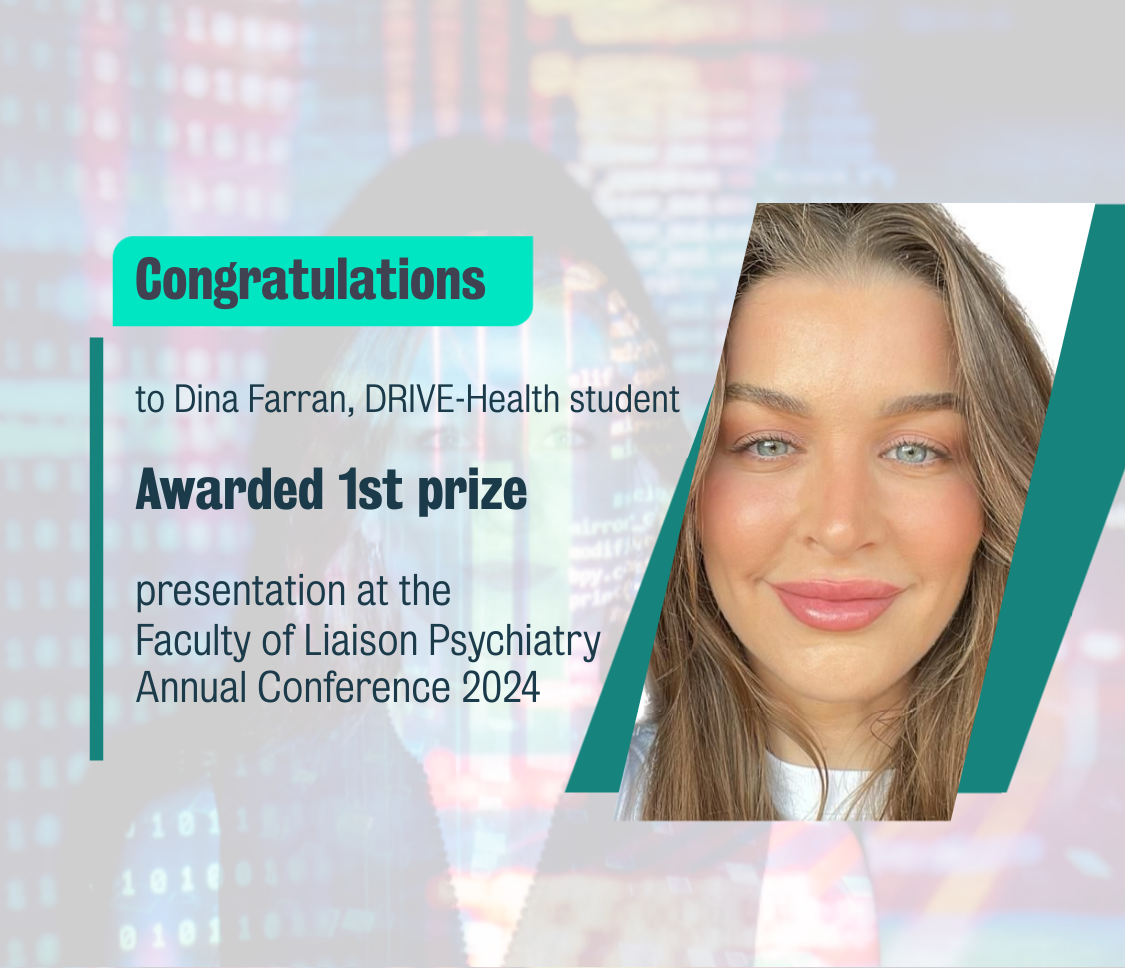
We are delighted to share that one of our EPSRC DRIVE-Health CDT students and PhD candidate at the IoPPN, Dina Farran, has been awarded 1st prize presentation at the recent Royal College of Psychiatrists Faculty of Liaison Psychiatry annual conference earlier this month. Dina is working under the supervision of Professor Fiona Gaughran and Professor Mark Ashworth and is about to submit her thesis at the end of this month. In the presentation, Dina summarised her PhD project consisting of a literature review, 2 observational studies, an intervention and 2 qualitative studies. Dina provides further detail below. Background Atrial fibrillation (AF), the most prevalent cardiac arrhythmia, is associated with an increased risk of stroke contributing to heart failure and death. In this project, we aim to improve patient safety by screening for stroke risk among people with AF and co-morbid mental illness. Methods (a) Conducted a systematic review and meta-analysis on prevalence, management, and outcomes of AF in people with Serious Mental Illness (SMI) versus the general population. (b) Evaluated oral anticoagulation (OAC) prescription trends in people with AF and co-morbid SMI in King’s College Hospital. (c) Identified the recorded rates of OAC prescription among people with AF and various mental illnesses and evaluated the association between mental illness severity and OAC prescription in eligible patients in South London and Maudsley (SLaM) NHS Foundation Trust. (d) Implemented an electronic clinical decision support system (eCDSS) consisting of a visual prompt on patient electronic Personal Health Record to screen for AF-related stroke risk in three Mental Health of Older Adults wards at SLaM. (e) Assessed the feasibility and acceptability of the eCDSS by qualitatively investigating clinicians’ perspective of the potential usefulness of the eCDSS (pre-intervention) and their experiences and their views regarding its impact on clinicians and patients (post-intervention). Results (a) People with SMI had low reported rates of AF. AF patients with SMI were less likely to receive OAC than the general population. When receiving warfarin, people with SMI, particularly bipolar disorder, experienced poor anticoagulation control compared to the general population. Meta-analysis showed that SMI was not significantly associated with an increased risk of stroke or major bleeding when adjusting for underlying risk factors. (b) Among AF patients having a high stroke risk, those with co-morbid SMI were less likely than non-SMI patients to be prescribed any OAC, particularly warfarin (but not DOACs). However, there was no evidence of a significant difference between the two groups since 2019. (c) Adjusting for age, sex, stroke and bleeding risk scores, patients with AF and co-morbid SMI were less likely to be prescribed any OAC compared to those with dementia, substance use disorders or common mental disorders. Among AF patients with co-morbid SMI, warfarin was less likely to be prescribed to those having alcohol or substance dependency, serious self-injury, hallucinations or delusions and activities of daily living impairment. (d) Clinicians were asked to confirm the presence of AF, clinically assess stroke and bleeding risks, record risk scores in clinical notes and refer patients at high risk of stroke to OAC clinics. (e) Clinicians reported that the eCDSS saved time, prompted them towards guidelines, boosted their confidence, and identified patients at risk. Perceived barriers to using the tool included low admission rate of AF cases, low or insufficient visibility of the alert/awareness of the tool, and impact of the eCDSS on workload. Conclusions This study presents a unique opportunity to quantify AF patients with mental illness who are at high risk of severe outcomes, using electronic health records. This has the potential to improve health outcomes and therefore patients' quality of life.
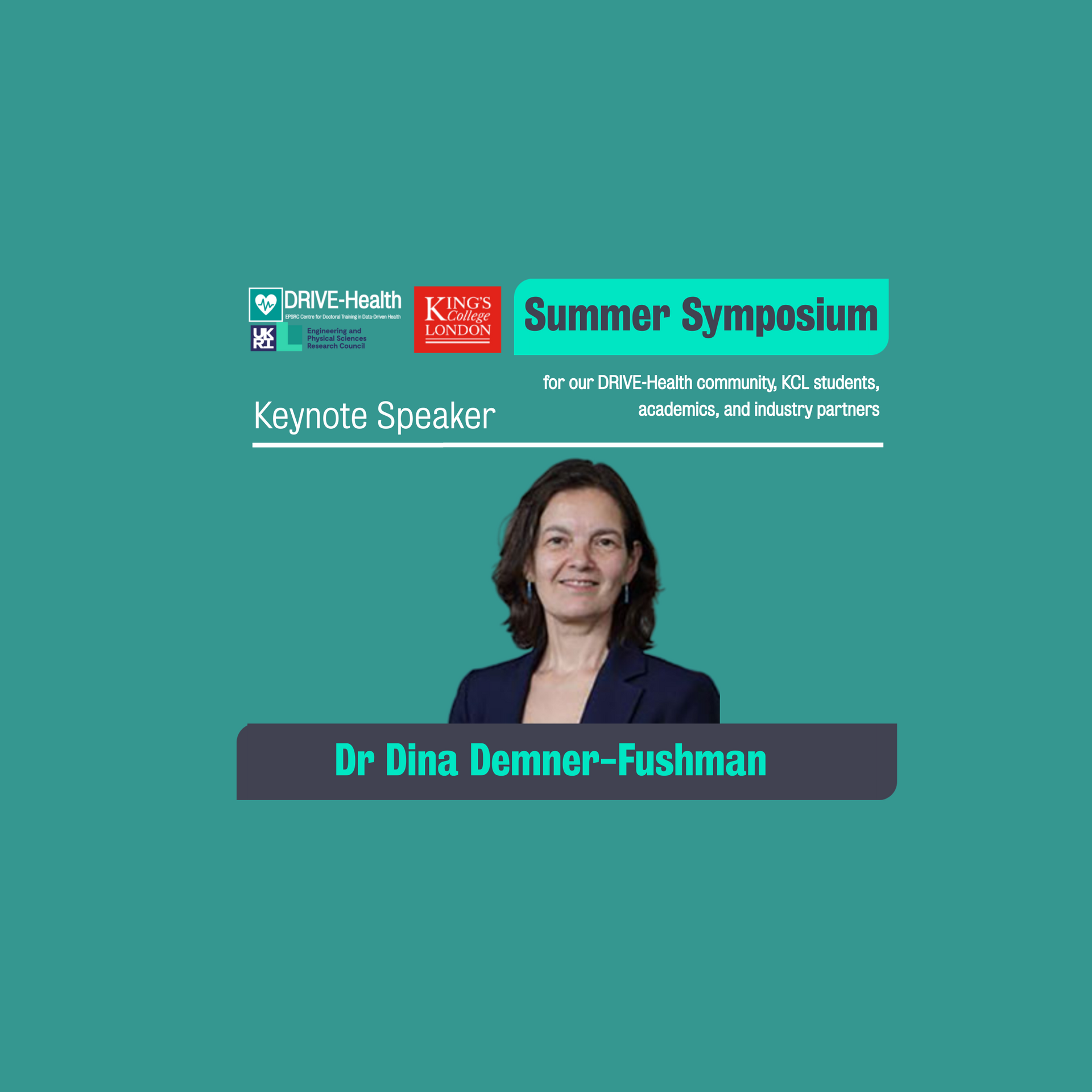
We are delighted to announce our first keynote speaker for the EPSRC DRIVE-Health CDT's summer symposium next month. Dr Dina Demner-Fushman joins us from the National Library of Medicine (NLM) to talk about "Getting AI generated results into decision support workflows: research, clinical and policy perspectives." Dina will share insights drawn from her experience utilising a Clinical Decision Support (CDS) tab within the National Institutes of Health's EHR system, and present recent research on the application of LLMs for predicting patient outcomes and generating progress notes. Dina Demner-Fushman, MD, PhD is an Investigator at the National Library of Medicine, NIH, HHS. Dr. Demner-Fushman leads research in the areas of Text and Image Processing for Clinical Decision Support and Education. The outgrowths of these projects are the evidence-based decision support system used at the NIH Clinical Center from 2009 to 2020, an image retrieval engine, Open-i, launched in 2012, and an automatic question answering service CHiQA launched in 2018. Dr. Demner-Fushman earned her doctor of medicine degree from Kazan State Medical Institute in 1980, and clinical research Doctorate (PhD) in Medical Science degree from Moscow Medical and Stomatological Institute in 1989. She earned her MS and PhD in Computer Science from the University of Maryland, College Park in 2003 and 2006, respectively. She earned her BA in Computer Science from Hunter College, CUNY in 2000. She authored more than 300 articles and book chapters in the fields of information retrieval, natural language processing, and biomedical and clinical informatics. Dr. Demner-Fushman is a Fellow of the American College of Medical Informatics (ACMI), an Associate Editor of the Journal of the American Medical Informatics Association, a member of Nature’s Scientific Data Editorial Board, chair of AMIA NLP SIG (2020-2023), and a founding member of the Association for Computational Linguistics (ACL) Special Interest Group on biomedical natural language processing. As the secretary and now chair of this group, she has been an essential organizer of the yearly ACL BioNLP Workshop since 2007. Dr. Demner-Fushman has received sixteen staff recognition and special act NLM awards since 2002. She is a recipient of the 2012, 2022, and 2023 NIH Award of Merit, a 2013 NLM Regents Award for Scholarship or Technical Achievement and a 2014 NIH Office of the Director Honor Award. Registration is required, please email drivecdt@kcl.ac.uk for further event details. Our annual Symposium is a one-day face-to-face event for all DRIVE-Health students, academic supervisors, stakeholders and partners. Our aim is to discuss translating scientific and technological innovations in AI and data science, from research to clinical practice and commercial enterprise. The symposium will feature keynote talks, panel discussions, and poster presentations showcasing cutting-edge research and successful case studies. We will also celebrate our coming together with networking drinks at the end of the symposium. The EPSRC DRIVE-Health Centre for Doctoral Training is training the next generation of PhD health data scientists to become the innovation leaders of tomorrow. Our students work within an active NHS environment, and develop new models of data-driven care, whilst leveraging significant recent investment and infrastructure in Health Data Research within the UK. By registering for this event, you give consent to provide your name, e-mail address and registration information with King's College London for the purposes of managing the EPSRC DRIVE-Health CDT's Summer Symposium. Your personal data will be managed by those organisations and by Eventbrite according to their published privacy policies.
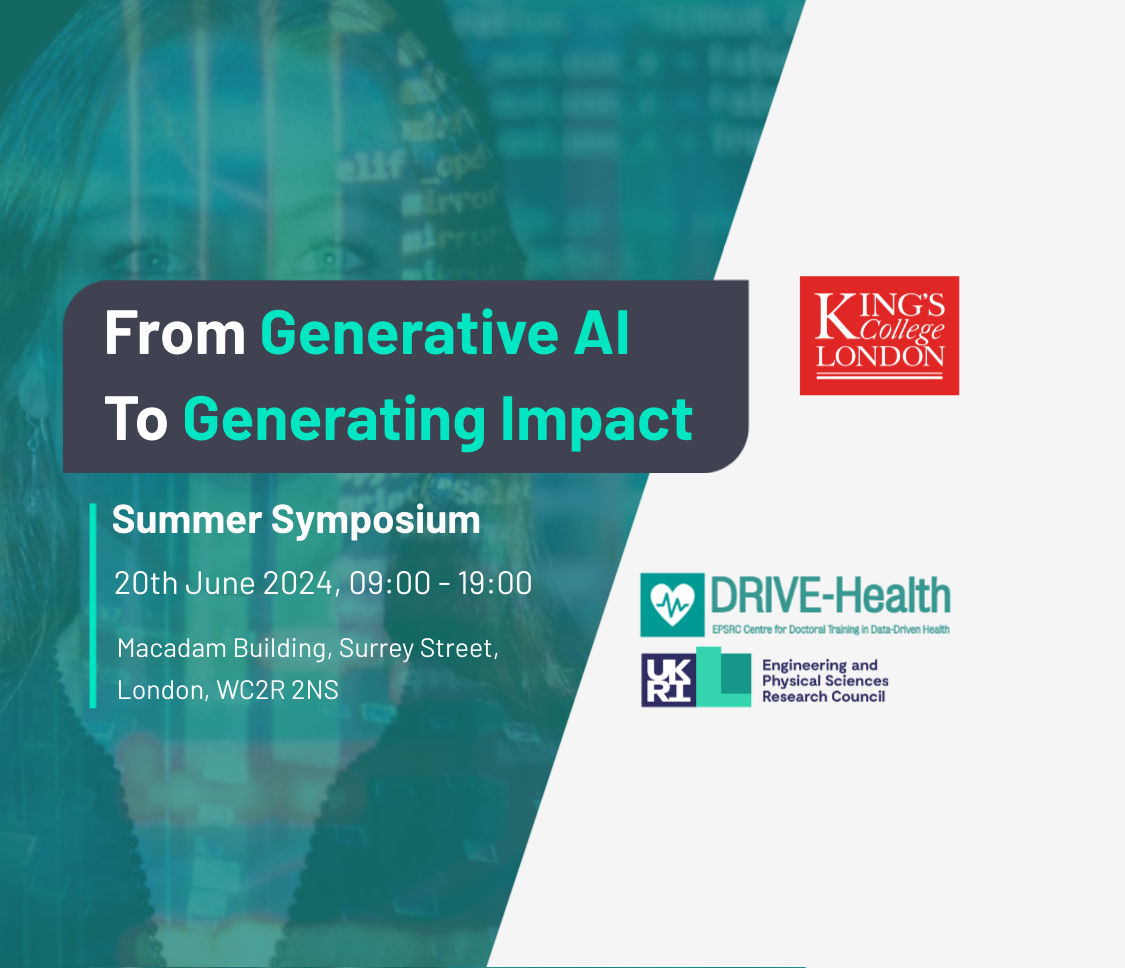
Join our DRIVE-Health community for an exciting in-person event where we dive into the world of Generative AI and how it is shaping the future of healthcare. Our theme this year is ‘From Generative AI to Generating Impact,’ which aims to explore the ways in which developing and deploying AI in the real-world influences healthcare outcomes and advances medical research. From cutting-edge technologies to real-world applications, this symposium will explore the latest trends and innovations in the field. Meet students from across KCL faculties, network with industry partners, exchange ideas, and gain valuable insights to drive results in your own projects. Don't miss out on this opportunity to be part of the conversation! Registrations have now close. To be added to the waiting list, please email drivecdt@kcl.ac.uk Our annual Symposium is a one-day face-to-face event for all DRIVE-Health students, academic supervisors, stakeholders and partners. Our aim is to discuss translating scientific and technological innovations in AI and data science, from research to clinical practice and commercial enterprise. The symposium will feature keynote talks, panel discussions, and poster presentations showcasing cutting-edge research and successful case studies. We will also celebrate our coming together with networking drinks at the end of the symposium. The EPSRC DRIVE-Health Centre for Doctoral Training is training the next generation of PhD health data scientists to become the innovation leaders of tomorrow. Our students work within an active NHS environment, and develop new models of data-driven care, whilst leveraging significant recent investment and infrastructure in Health Data Research within the UK. By registering for this event, you give consent to provide your name, e-mail address and registration information with King's College London for the purposes of managing the EPSRC DRIVE-Health CDT's Summer Symposium. Your personal data will be managed by those organisations and by Eventbrite according to their published privacy policies.
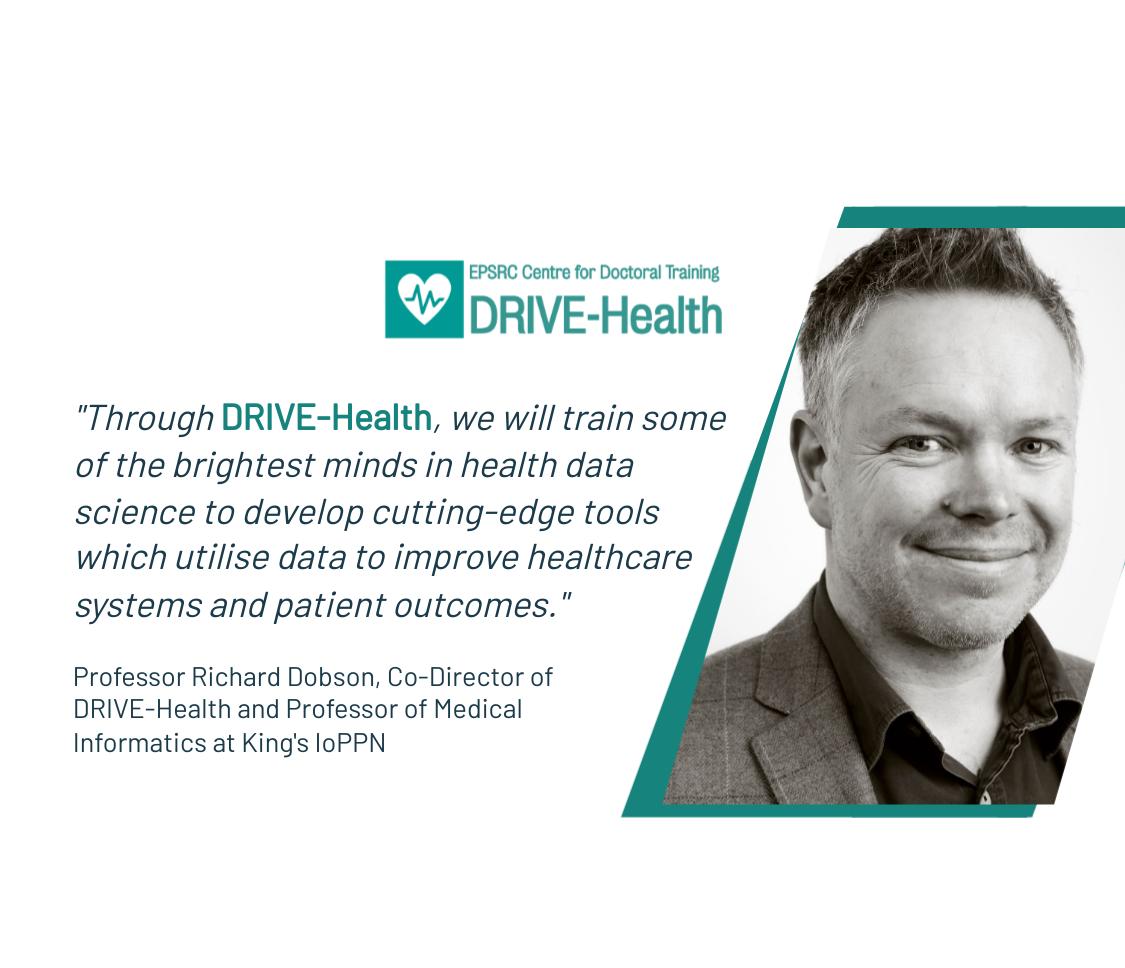
DRIVE-Health has been awarded £7.9 million from The Engineering & Physical Sciences Research Council (EPSRC) for student intake from 2024 onwards. DRIVE-Health is one of 65 CDTs which received funding, totalling more than £1 billion. Using seed funding from King’s Centre for Doctoral Studies awarded in 2020, DRIVE-Health has trained 30 students to date. Building on this, the new award will support five additional cohorts at King’s, totalling at least 85 talented PhD students. The CDT is expecting to welcome its fourth intake of at least 15 students in October 2024. DRIVE-Health is the first health data science training centre in the UK to harness cross-sector collaboration across the NHS, industry, enterprise, policy makers, and academia. Working with diverse partners, DRIVE-Health PhD students develop cutting-edge models which leverage healthcare data to improve patient outcomes, streamline operations, and enhance clinical decision-making processes. EPSRC CDT DRIVE-Health’s vision is informed by three core goals: To provide world-class training in health data science research to the next generation of health data scientists, who will have the multidisciplinary skills needed to enable transformations in public health and breakthrough treatments. To solve the most challenging problems in data-driven health research through a diverse community of the brightest minds in health data science and an open, collaborative culture which fosters exchange and champions innovation. To co-create a translational cross-sector collaboration with the NHS, industry, enterprise, policy makers and academia. Professor Richard Dobson, Co-Director of DRIVE-Health and Professor of Medical Informatics at King’s IoPPN, says "As more data from biological, social, genomic, imaging, smart devices, and electronic health records becomes available, there are significant opportunities to revolutionise the way healthcare is delivered. Through DRIVE-Health, we will train some of the brightest minds in health data science to develop cutting-edge tools which utilise data to improve healthcare systems and patient outcomes." "This is an exciting time for medicine, with new data paradigms creating a novel research and implementation landscape covering the full span from cell to society. Over the next nine years, DRIVE-Health will nurture world-class researchers that will chart that landscape and drive the UK’s health data agenda." Professor Vasa Curcin, Co-Director of DRIVE-Health and Professor of Health Informatics at King’s FoLSM. The DRIVE-Health PhD Programme (2024-2032) focuses on five key scientific research themes: Sustainable health data systems engineering: Investigates methods to develop secure and scalable software systems for healthcare. Theme lead: Dr Zina Ibrahim. Multimodal patient data streams: Integrates diverse patient data types for analysis, including wearables and electronic health records. Theme lead: Dr Jorge Cardoso. Complex simulations and digital twins: Builds simulated environments to train AI models for healthcare applications. Theme lead: Dr Steffen Zschaler. Next-generation clinical user interfaces: Ensures healthcare data science applications are usable in clinical settings. Theme lead: Professor Nick Holliman. Co-designing impactful patient-centric healthcare solutions: Co-producing and co-designing healthcare solutions to maximise impact across all themes. Theme lead: Professor Claire Steves. On top of the £7.9m provided by the EPSRC, DRIVE-Health has received over £5.1m from partners, as well as in-kind contributions worth nearly £4m.
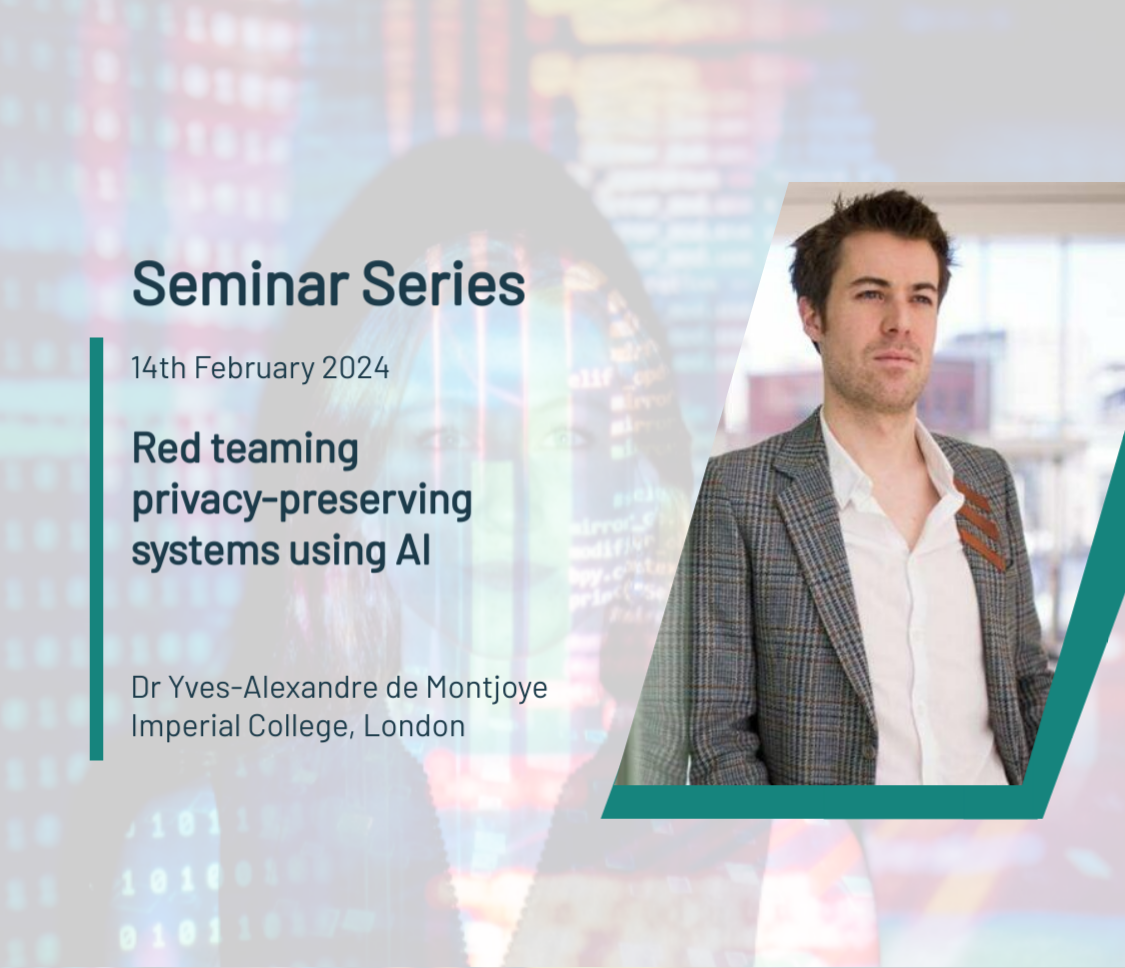
We are delighted to announce that our first Seminar Series of 2024 will be hosted by the esteemed Dr Yves-Alexandre de Mountjoye from Imperial College, London. Companies and governments are increasingly relying on privacy-preserving techniques to collect and process sensitive data. In this talk, Yves-Alexandre will discuss their efforts to red team deployed systems and argue that red teaming is essential to protect privacy in practice. He will describe how traditional de-identification techniques mostly fail in the age of big data and then show how implementation choices and trade-offs have enabled attacks against real-world systems, from query-based systems to differential privacy mechanisms and synthetic data. He plans to conclude by describing recent successes in using AI to automatically discover vulnerabilities.
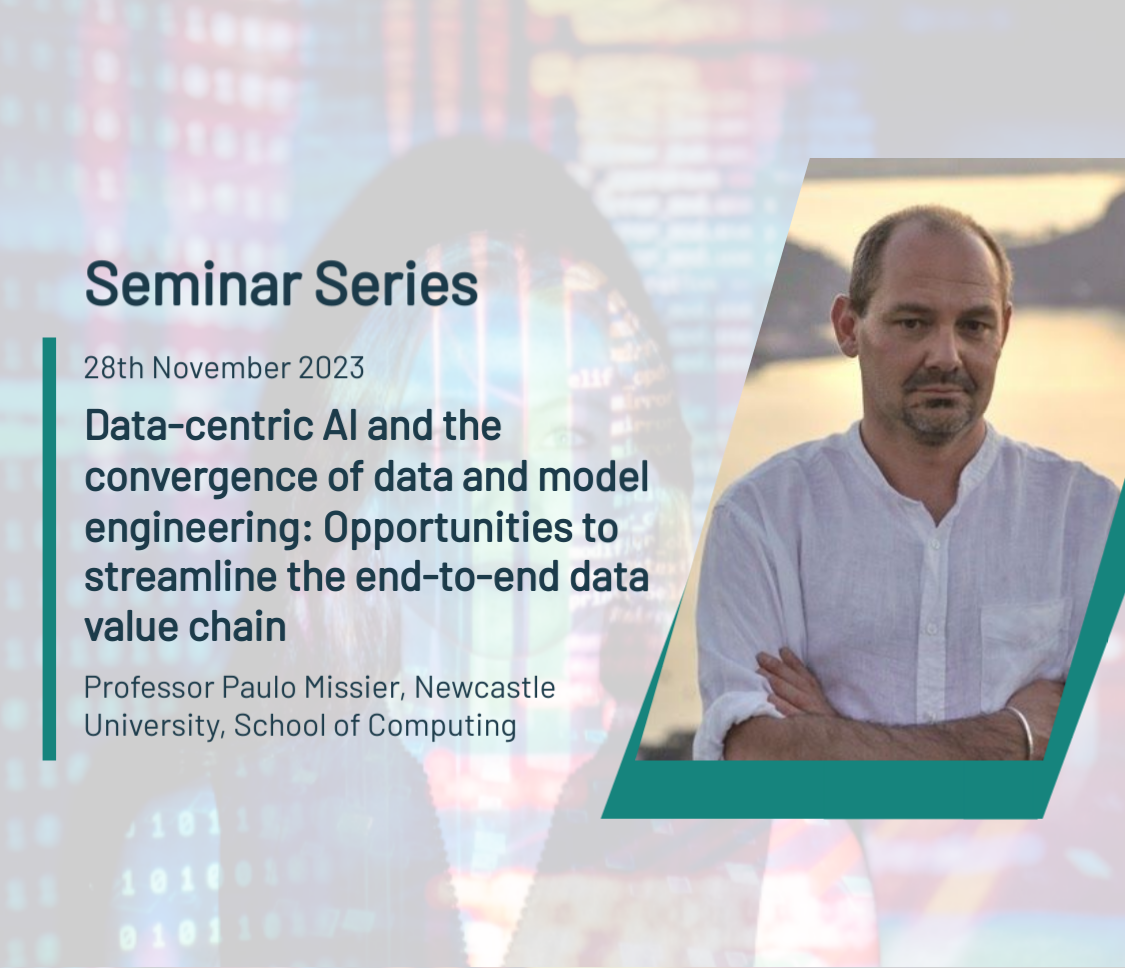
We were delighted to welcome Professor Paulo Missier who hosted last seminar series of 2023. The past few years have seen the emergence of what the AI community calls “Data-centric AI”, namely the recognition that some of the limiting factors in AI performance are in fact in the data used for training the models, as much as in the expressiveness and complexity of the models themselves. One analogy is that of a powerful engine that will only run as fast as the quality of the fuel allows. A plethora of recent literature has started exploring the connection between data and models in depth, along with startups that offer “data engineering for AI" services. Some concepts are well-known to the data engineering community, including incremental data cleaning, multi-source integration, or data bias control; others are more specific to AI applications, for instance the realisation that some samples in the training space are "easier to learn from” than others. In this “position talk”, Paulo suggested that, from an infrastructure perspective, there is an opportunity to efficiently support patterns of complex pipelines where data and model improvements are entangled in a series of iterations. He focused in particular on end-to-end tracking of data and model versions, as a way to support MLDev and MLOps engineers as they navigate through a complex decision space.
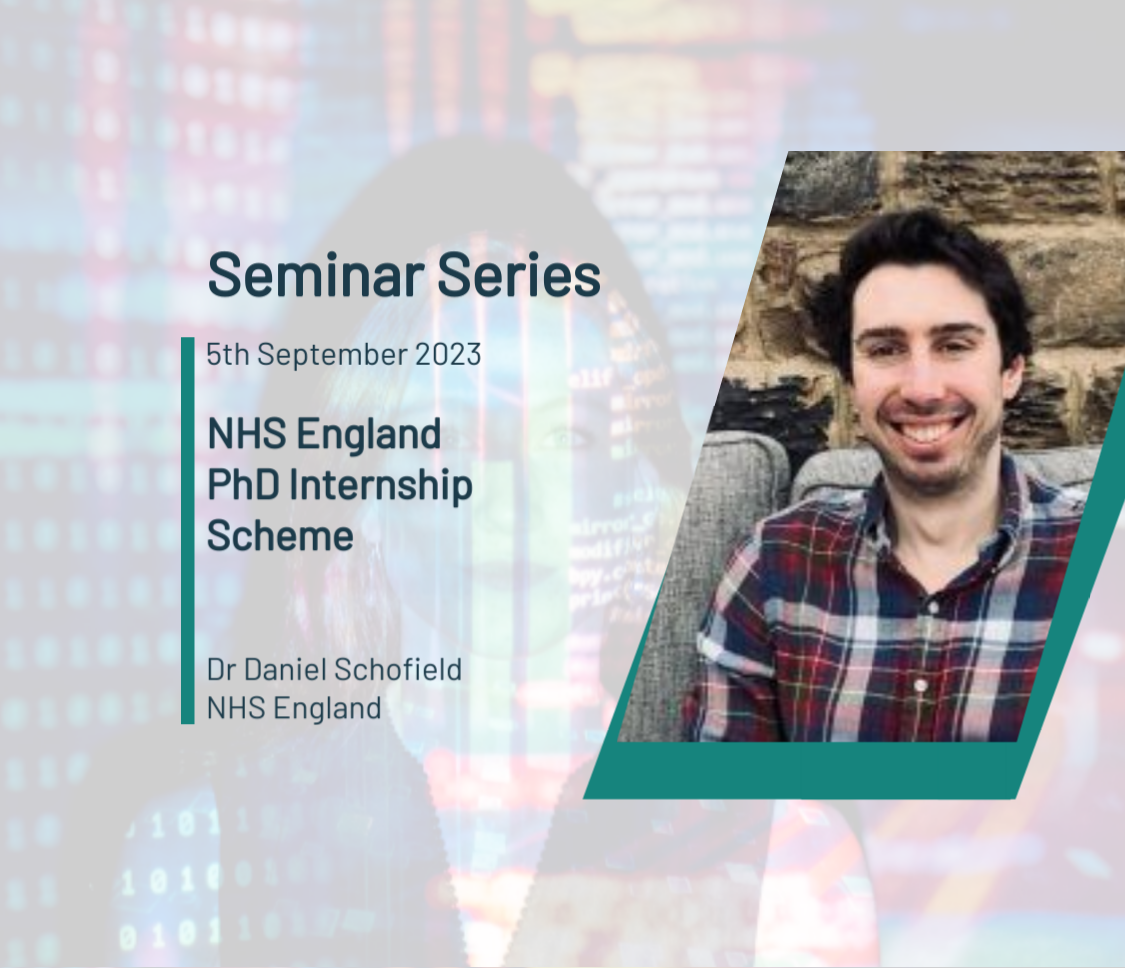
We were delighted to welcome Dr Daniel Schofield who hosted our September seminar series. Daniel provided an overview of the team that hosts the internship scheme at NHS England and offered further insights on how the scheme is designed, information on a couple of recent projects plus those available for the coming intake. He presented the different ways of working in the scheme and within the wider organisation.
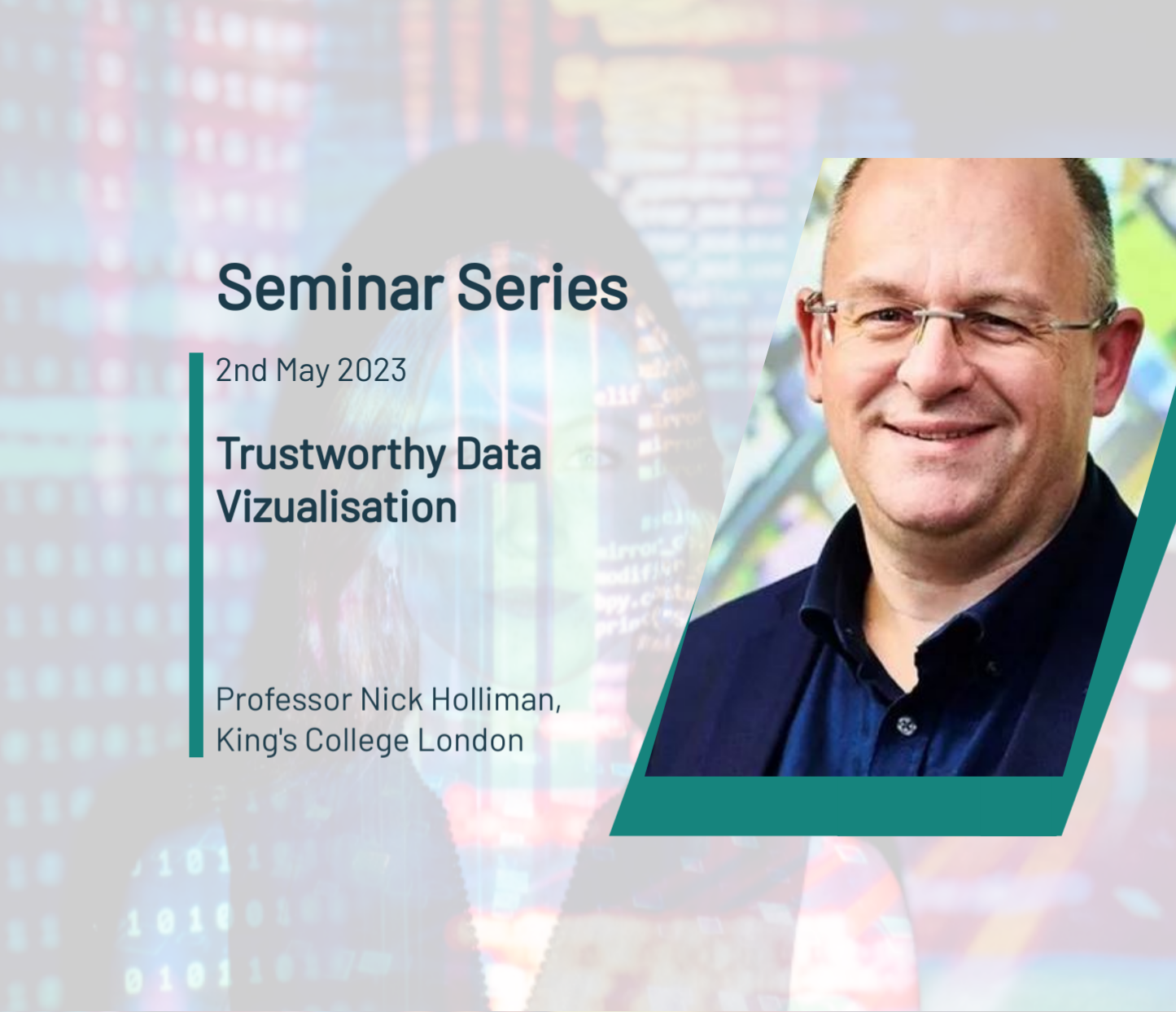
We were delighted to have Nick Holliman, from KCL host our May seminar series. Nick demonstrated how their recent research applying information theoretic methods to the challenges of urban data vizualisation addresses key questions for visualization researchers, and argues that successful data visualization increasingly needs rigorous underpinning science.
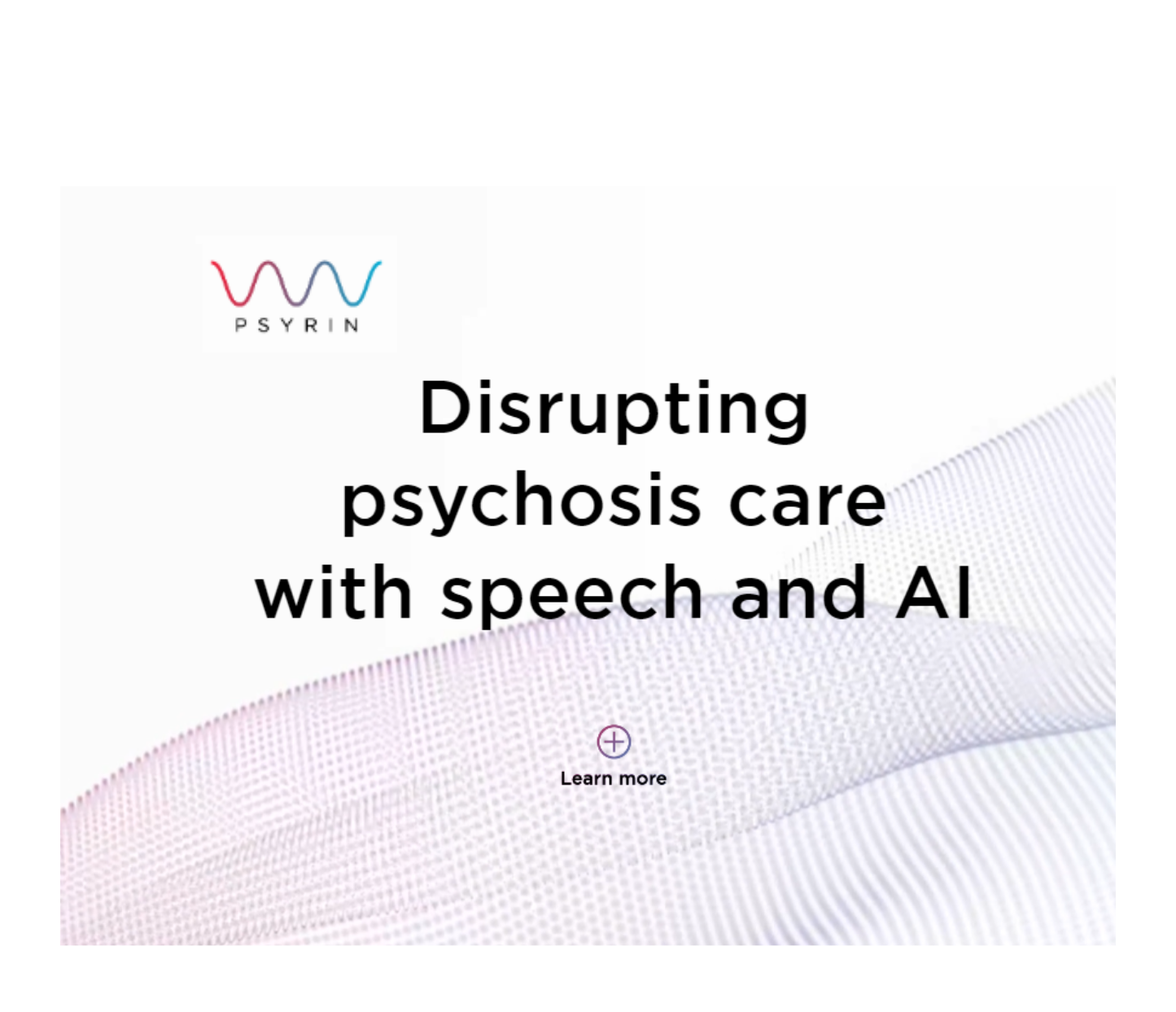
A London-based startup looking to transform psychosis care through the power of speech has been developing machine learning algorithms that will detect impending psychosis from speech samples collected using just a smartphone. With Psyrin, practitioners along the psychosis care pathway will save time, improve triage accuracy, and increase capacity. Julianna, one of the co-founders of Psyrin has been inspired by the suffering of her loved ones to work on solving mental health problems. By studying psychology, she realized the importance of prevention in mental health care. "In case of severe mental disorders, especially in psychosis, the effect of prevention and early intervention can be really difference-making in the patient's life. However, preventative treatments need tools and technology to upscale and be accessible for as many people as possible." At Psyrin, they want to unlock the potential of objective, scalable, AI-powered analysis of speech to help clinicians screen, triage and monitor and understand patients better, in a more effective way and eventually, use their technology to transform psychosis care pathways from reactive to preventative. Supported by the King's Entrepreneurship Institute .




